Undergraduate Prospectus 2026 Entry
Your guide to degrees and student life at UCL


Undergraduate Prospectus 2026 Entry
Your guide to degrees and student life at UCL


UCL East campus approx. 40 mins travel
King’s Cross / St Pancras Stations
18 mins walk from UCL
Euston Station
7 mins walk from UCL

Stratford Station
Stratford International Station
UCL Bloomsbury campus approx. 40 mins travel
Pudding Mill Lane Station
12 mins walk from UCL East
British Museum

London Aquatics Centre
The London Eye Houses of Parliament
Oxford Street
UCL Bloomsbury campus
University College Hospital
The O2 Canary Wharf River Thames
UCL East campus
ArcelorMittal Orbit

BBC Sadler’s
Wells East
UAL London
College of Fashion
V&A East
Queen Elizabeth Olympic Park
London Stadium
Copper Box Arena
UCL at Here East
As part of its accessibility mission, UCL is using NaviLens Accessible QR codes in its prospectus. These codes can be scanned from much further away, while moving and without the need to focus or frame the code. Simply download the NaviLens app to get started. The QR code at the centre can still be scanned using your camera or a standard QR reader.
We’re searching for independent-minded students with the courage to challenge convention and make a real difference to the future of this world.
Together, we form a diverse community of passionate visionaries, bold boundary-breakers and eternally curious minds.







40 Our world-leading faculties
52 Find your degree
54 Looking for inspiration?
56 Architecture, Construction and Planning
58 Arts and Sciences
60 Biological and Life Sciences
62 Business and Management Studies
63 Communications and Media
64 Computer Science
65 Economics, Geography, Politics and Social Sciences
67 Education
68 Engineering
70 English and Comparative Literature
71 Fine Art and Art History
72 Historical and Philosophical Studies
74 Languages and Cultural Studies
78 Law
79 Mathematics and Statistics
81 Medicine, Health and Allied Subjects
83 Physical Sciences
85 Psychology and Language Sciences

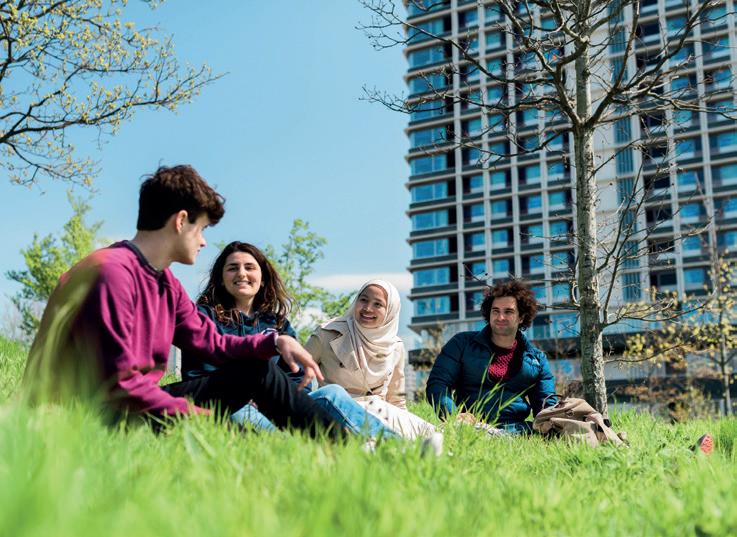

1. MIT
2. Imperial College London
3. University of Oxford
4. Harvard University
5. University of Cambridge
6. Stanford University
7. ETH Zurich
8. National University of Singapore
9. University College London (UCL)
10. California Institute of Technology (Caltech)
QS World University Rankings 2025
– World-leading, worldimpacting research *
– 400+ degree programmes
– Students from more than 150 countries
– 32 Nobel laureates
– An award-winning sustainable university ^
– Over 430 student clubs and societies
– In the heart of London, the world’s best student city **
– UCL graduates earn above the Russell Group and UK median average^^
* Research Excellence Framework (REF 2021)
We’re proud of our groundbreaking history, distinguished present and exciting future. UCL is a great place to be a student for so many reasons.
^ People & Planet University League for environmental and ethical performance;
QS World University Rankings: Sustainability 2025
** QS Best Student Cities 2018, 2019, 2022, 2023, 2024, 2025
^^ Three years following graduation, UCL undergraduate students earn 9.1% above the Russell Group median average and 24.1% above the UK median average excluding professions with standardised salary scales and all other subjects excluding Creative arts and design. (2021-22 Longitudinal Education Outcomes [LEO])
We have a proud heritage of radical ideas, a reputation for game-changing research and a unique multidisciplinary approach to problem solving.

UCL has confronted humanity’s biggest issues since 1826. At that time, attending university was a rare privilege. If you weren’t a man from a wealthy background and a member of the established church, higher education was off limits.
Our founders tore up that rule book. We were the first university in England to welcome students of any religion or social background. We were also the first in England to welcome women to university education.
We have challenged inequality ever since, and we hold a Silver Athena SWAN award in recognition of our progressive work practice. Each year, we invest £13.5 million in bursaries and activities to support students from diverse backgrounds to enter and succeed.
UCL is committed to widening access to higher education. Students who are domiciled in the UK and are from groups that are underrepresented at UCL may be eligible for a contextual offer as part of the Access UCL scheme (see p.88).
We have expanded from our beginnings in Bloomsbury with UCL East, a new campus on Queen Elizabeth Olympic Park in Stratford, East London, that is fit for the 21st century and beyond. With physical spaces that are publicly accessible and programmes built around working with local communities, this next chapter for UCL embodies our founding principles – to better understand global challenges by bringing together diverse viewpoints.
Since our founding we have continually innovated our teaching methods and we make research the cornerstone of our students’ activity. Programmes such as Arts and Sciences BASc lead the way in interdisciplinary study and elsewhere, collaborative teaching methods are breaking down the boundaries between student and teacher, encouraging the thinkers of tomorrow.
In February 2026, we will begin the celebrations for our 200th anniversary, with an exciting year-long programme of activities and events. The UCL200 Programme will show our commitment to our core values, embrace our entrepreneurial spirit, inspire future leaders and contribute to a world where knowledge, research and innovation serve as a force for positive good.
As well as reflecting on our past, we will use the bicentenary to frame the future and share the type of organisation that we will become. We are working with our diverse UCL community to co-create and co-develop the UCL200 Programme, providing opportunities for our undergraduate and postgraduate student communities to get involved and make this milestone their own.
This is a unique occasion for our community and all UCL students will be provided with an unprecedented opportunity to experience a range of internal and public activities and educational opportunities across 2026.
Visit our website for more information on our bicentenary and how students can get involved: www.ucl.ac.uk/UCL200
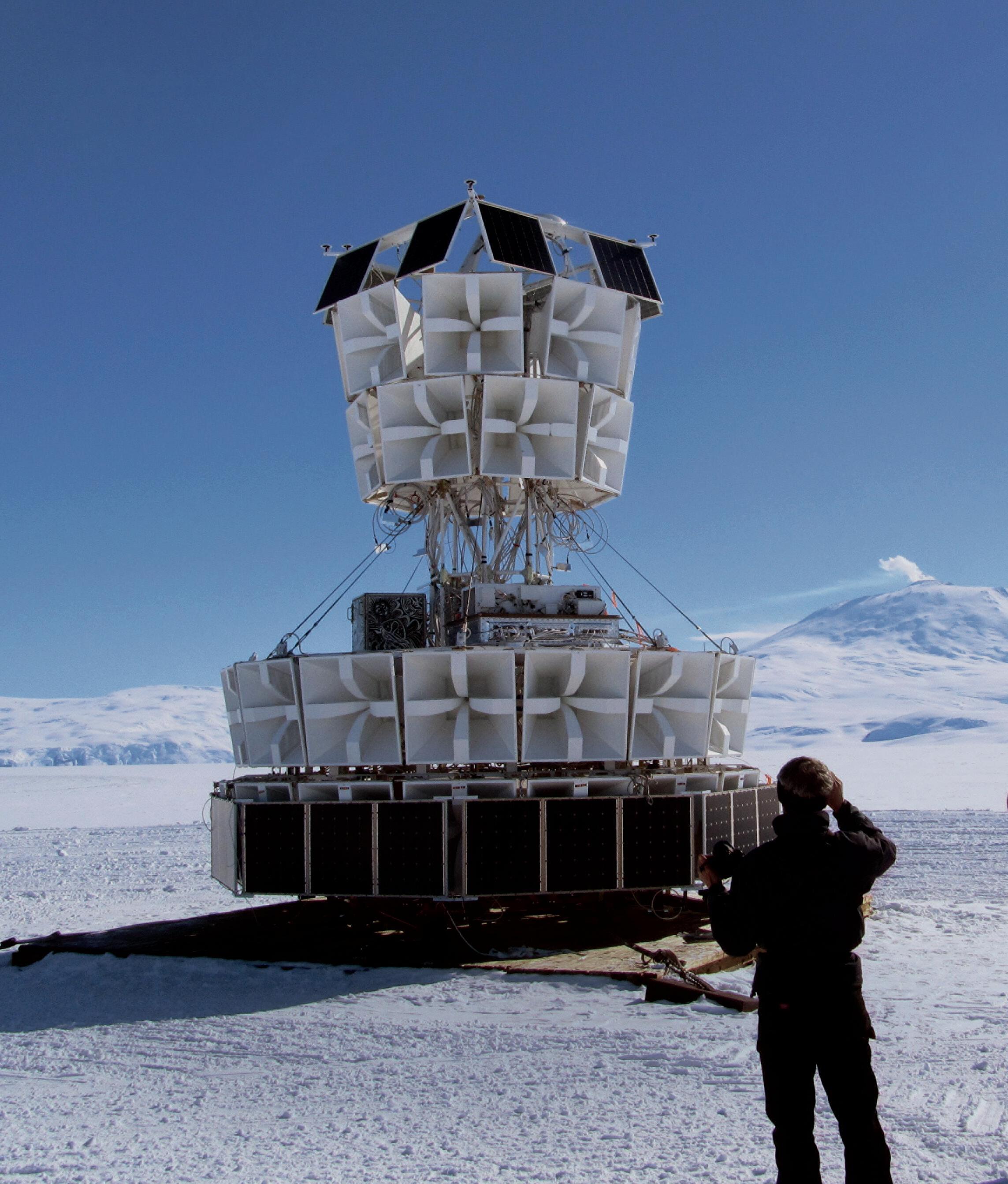


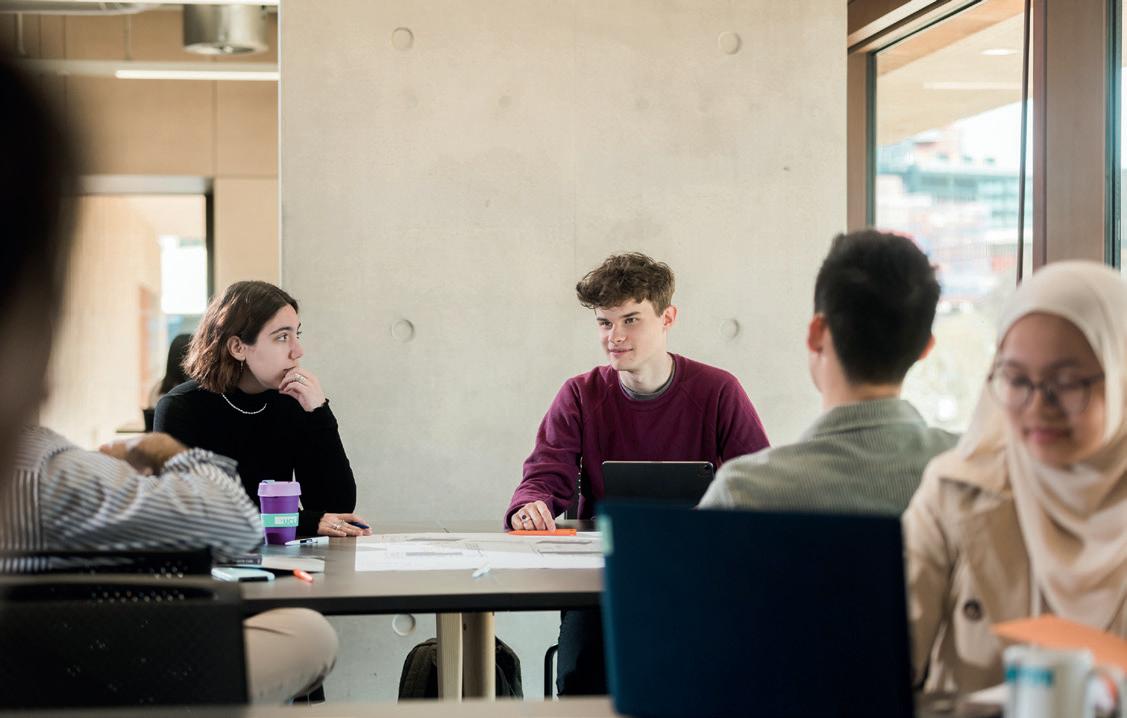
We are here to further your knowledge, develop your skills of analysis and problem-solving and give you a truly global outlook that draws on diverse cultural perspectives.
Studying in London, you’ll be living, learning and growing your network in one of the world’s greatest cities. At UCL you’ll have the chance to work alongside some of the world’s leading researchers. They will drive you to think more analytically and independently – providing opportunities to undertake research activities of your own and create original output.
Learning as part of an international community of great minds, you will develop the cultural fluency and global outlook that are prized by employers.
Throughout your time here, you’ll have many opportunities to shape our curriculum and how it’s delivered. Our collaborative approach also helps build the essential skills that make UCL graduates so in-demand, such as communication, teamwork, negotiation, entrepreneurship and project management.
Scan the NaviLens QR code, or search: ‘Discover UCL’ in YouTube to find out more.
UCL staff and alumni have won at least one Nobel Prize each decade since the award began in 1901, with more than half of our 32 Nobel laureates born outside the UK.



1904 – Chemistry
Sir William Ramsay
Discovered the noble gases: helium, argon, neon, krypton and xenon.
1913 – Literature
Rabindranath Tagore
Wrote profoundly sensitive, fresh and beautiful verse.
1915 – Physics
Sir William Henry Bragg
Analysed the structure of crystals using X-rays.
1921 – Chemistry
Frederick Soddy
Invented the concept of isotopes.
1922 – Physiology or Medicine
Archibald Vivian Hill
Founded biophysics.
1928 – Physics
Owen Willans Richardson
Discovered the law of thermionic emission.
1929 – Physiology or Medicine
Sir Frederick Gowland Hopkins
Discovered growthstimulating vitamins.
1936 – Physiology or Medicine
Sir Henry Hallett Dale and Otto Loewi
Discovered neurotransmitters.
1938 – Physiology or Medicine
Corneille Jean Francois Heymans
Revealed how respiration is regulated.
1944 – Chemistry
Otto Hahn Made discoveries leading to the development of nuclear technology.
1947 – Chemistry
Robert Robinson
Discovered the structure of morphine and strychnine.
1955 – Chemistry
Vincent du Vigneaud
Carried out the first synthesis of a polypeptide hormone, oxytocin.
1959 – Chemistry
Jaroslav Heyrovsky
Discovered polarography, widely used in clinical and environmental analysis.
1960 – Physiology or Medicine
Peter Brian Medawar
Discovered the key to successful organ and tissue transplantation.
1962 – Physiology or Medicine
Francis Harry Compton Crick
Discovered the molecular structure of nucleic acids (DNA).
1963 – Physiology or Medicine
Andrew Fielding Huxley
Revealed how activity is co-ordinated by a central nervous system.
1967 – Chemistry
George Porter (Baron Porter of Luddenham) Devised flash photolysis to observe free radicals.
1970 – Physiology or Medicine
Sir Bernard Katz and Ulf Svante von Euler Advanced remedies against nervous and mental disturbances.
1988 – Physiology or Medicine
Sir James Black
Discovered the first beta-blocker, propranolol.
1991 – Physiology or Medicine
Bert Sakmann
Discovered the role of ion channels in diseases, revolutionising cell biology.
2000 – Economics
James Heckman
Developed statistical analysis of individual and household behaviour.
2001 – Physiology or Medicine
Sir Paul Nurse
Enabled new avenues of research in tumour diagnostics and therapy.
2007 – Physiology or Medicine
Sir Martin Evans
Introduced gene modifications in mice.
2009 – Physics
Sir Charles Kao
Developed the transmission of light for optical communication
2013 – Physics
Peter Higgs
Predicted the particle: the Higgs boson.
2013 – Physiology or Medicine
James Rothman
Revealed how substances are trafficked by vesicles in our cells.
2014 – Physiology or Medicine
John O’Keefe
Discovered the ‘inner GPS’ in the brain.
2020 – Physics
Sir Roger Penrose
Proved that the general theory of relativity predicts the formation of black holes.
2024 – Physics
Geoffrey E. Hinton
Made foundational discoveries and inventions that enable machine learning with artificial neural networks.
2024 – Chemistry
Sir Demis Hassabis
Predicted the three-dimensional structure of almost all 200 million known proteins using artificial intelligence.
UCL staff and students come from richly diverse backgrounds across the world. We use this truly global perspective to help solve the pressing issues of our times.
To join us scan the NaviLens QR code, or search: ‘Made at UCL’ to find out more.
Our cutting-edge research has a real-world impact on everything from climate change to plastic pollution, infant mortality to social inequality.
In 2008 we established the UCL Grand Challenges, to stimulate and support crossdisciplinary research and develop holistic solutions to complex global problems. Since then we have brought together more than 850 researchers from 170 different centres, institutes and departments across UCL and provided more than £1.9m in funding to more than 440 projects.
We have set five new themes, beginning in 2023, in the fields of climate crisis, mental health and wellbeing, data-empowered societies, inequalities and intercultural communication. These challenges help us to translate our world-class research into real-world impact.
Patterns of tree diversity across the world’s tropical forests
A major international collaboration of 356 scientists led by UCL researchers has found almost identical patterns of tree diversity across the world’s tropical forests. According to lead author Dr Declan Cooper (UCL Geography and UCL Centre for Biodiversity and Environmental Research), by focusing on understanding the commonest tree species, “we can probably predict how the whole forest will respond to today’s rapid environmental changes.”


New views of the Universe captured by the Euclid telescope
New images were captured by the European Space Agency’s Euclid Telescope, whose optical camera was designed and built by an international team led by UCL researchers. The images showcasing galaxy clusters, free-floating planets and a star-framing region enveloped in interstellar dust were created by combining data from Euclid’s two instruments: VIS, a visible light camera designed and developed over 16 years by Professor Mark Cropper (Mallard Space Science Laboratory at UCL) working with teams at UCL, Open University and across Europe, and the Near Infrared Spectrometer and Photometer (NISP).
Blood test could predict Parkinson’s disease years before symtoms have developed
A team of researchers, led by scientists at UCL and University Medical Center Goettingen, Germany, have developed a simple blood test that uses artificial intelligence to predict Parkinson’s disease, the world’s fastest growing neurodegenerative disorder, up to seven years before the onset of symptoms. Professor Kevin Mills (UCL Great Ormond Street Institute of Child Health) said: “As new therapies become available to treat Parkison’s, we need to diagnose patients before they have developed the symptoms. We cannot regrow our brain cells and...need to protect those that we have.”


UCL students develop software to revolutionise computer use
Groundbreaking software that allows users to control their PC through their webcam using face and body movements has been developed by a team of UCL Computer Science students in collaboration with Intel, Microsoft, IBM and the NHS. As well as its clinical uses and for those with mobility issues, the software – which is freely available for individual downloads – can also be used for teaching and presenting in schools, universities and businesses, and by people playing Windows computer games.

A UCL education is a climate education. We are Generation One – a collective of people committed to a new era of positive climate action. By turning science and ideas into activity, we are working towards creating a positive, fair and progressive future. For us and for the generations to come. Join us.
To join us scan the NaviLens QR code, or search: ‘UCL Generation One’ to find out more.
Our students bring new thinking on climate action to their studies and everyday lives. The UCL experience provides a wealth of opportunities to take climate action while you’re here and to develop as climate leaders when you go into the wider world.
We have launched a university-wide Grand Challenge on the climate crisis, which provides the focus to scale up our climate research and use this to support the way we tackle climate change through our operations.
We can all play our part. Get inspired by the extraordinary breadth of climate-focused activity taking place at UCL, find out about our Generation One campaign and how you can get involved.
Does the Earth have to be a fashion victim?
Every year, the fashion industry generates 10% of the world’s global carbon emissions. It’s why UCL scientists have pioneered a more sustainable method to help make propylene – a common ingredient in the fabrics and plastics of the clothes and shoes we wear.
Take action now
Visit a charity shop or try a swap shop when looking for a new outfit and reduce the 10,000 items of clothing sent to landfill every five minutes in the UK.

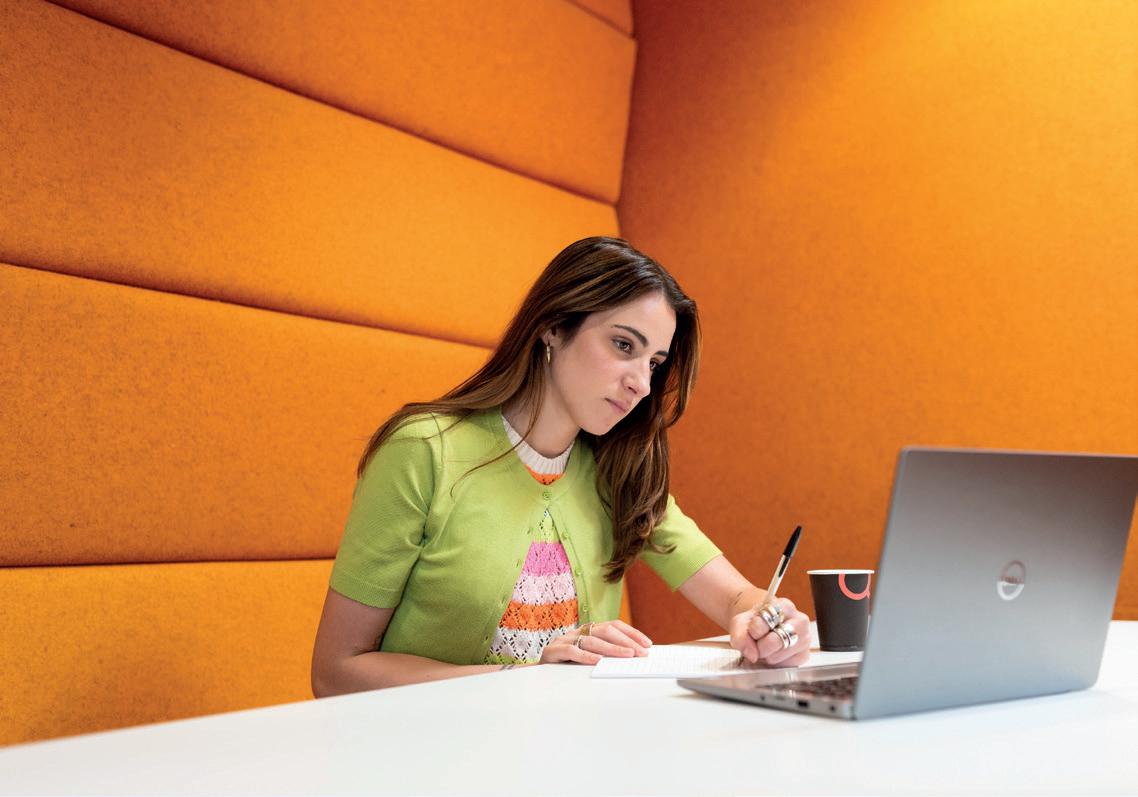
Artificial Intelligence (AI) - Climate Change friend or foe?
AI is being used by UCL researchers in work to track the environmental impact human activities have on the natural world, but is the use of AI an environmental hazard in itself?
Take action now
Give your inbox a clear-out to reduce the amount of cloud storage being used. Switch to ethical search engines like Ecosia and consider the physical resources AI platforms like ChatGPT use – writing a 100-word email using ChatGPT consumes aound 500 milliliters of water.
Trees matter, but just how much?
Trees are crucial to combating climate change. It’s why we’ve developed 3D laser mapping to help measure how much carbon dioxide the world’s trees absorb today – and predict how much they’ll store in the future.
Take action now
Use your smartphone to help NASA measure the world’s trees and find out how much carbon they store.


How far can we go with electric batteries?
Cars account for 18% of the UK’s carbon emissions, so it’s essential we move to electric vehicles. At UCL we’re developing lithium-ion battery cells with a higher energy density to enable electric vehicles to go further in between charges.
Take action now
Walking, cycling and public transport are still the most climate-friendly modes of travel. If you do have a car, electric or otherwise, keep your car tyres fully inflated to improve fuel efficiency by up to 3%.

Dubbed “the Duolingo of money”, Your Juno is helping to educate women and non-binary people on the topic of finances. The platform, which consists of hundreds of online courses, covers everything from how to make your first investment to how to do your taxes. Founded by UCL alumna Margot de Broglie (UCL Economics, 2019) and her sister, the financial education app Your Juno already has over 65,000 users and has raised over £2.5 million in investment.

Startup BoxxDocks, supported by UCL, has developed a track and trace platform, helping distributors to boost efficiency and cut emissions. BoxxDocks is the brainchild of UCL alumnus James Della Valle (BSc Architecture 2020 and MSc Architecture 2023) and Alessandro Attanzio. BoxxDocks recently launched their solution with Sigma Pharmaceuticals, a UK leading pharmaceutical distributor and have expanded into Europe with Italy as their base of operations for the EU.

Education technology and social impact startup ZNotes, founded by UCL alumnus Zubair Junjunia (UCL Mathematics), has evolved into a global force, reaching over six million students. ZNotes addresses educational inequalities by giving millions of students across 190 countries unrestricted access to high-quality educational content. The platform has developed into a global community and empowers learners to become active contributors in the education system.
Whether you want to boost your employability, tackle global issues or start your own venture, we can help you develop entrepreneurial skills to achieve your goals.
Our tailored, free extracurricular entrepreneurship programme, run by UCL Innovation and Enterprise, provides you with the skills, knowledge and hands-on experience you need to make a difference in the world.
If you want to grow your own venture, join our equity free Hatchery incubator programme at BaseKX, UCL’s dedicated entrepreneurship hub. Here you’ll have access to the co-working space, advice and connections you need to succeed.
Scan the NaviLens QR code, or search: ‘UCL entrepreneurship’ to find out more.
We are investing in a university fit for the 21st century and beyond. At UCL you'll find all the cutting-edge facilities you need to achieve great things.

We are over halfway through our 10-year, £1.25 billion investment in creating sustainable spaces and best-in-class facilities across London, giving our staff and students the tools to take their learning and discoveries further, with many award-winning projects in Bloomsbury already completed.
Designed entirely around our students’ needs, our Student Centre includes 1,000 individual, group and open-plan study spaces, quiet contemplation areas and easy access to help and support at the dedicated Student Enquiries Centre.
Our UCL East campus includes state-ofthe-art laboratories, fabrication workshops, collaboration areas and public spaces, providing facilities for cross-disciplinary research and open innovation, as well as new approaches to practical learning.
This world-class academic hub sits alongside contemporary student accommodation that provides an exciting student living experience in London’s vibrant East End.

Across UCL, we are creating an environment and student experience that encourages new ideas and invention and sparks creative connections.
We are establishing a living laboratory of learning in an area committed to biodiversity throughout the parklands and waterways that run through the Olympic Park. Wander through the landscaped park with its wetlands and wildlife and you will soon find Hackney Wick, a lively destination day or night, with its quirky cafés, eateries, craft breweries and bars along the River Lea canal.


Left: Public art installation Treˉow of Time by UCL alumni Larry Achiampong and David Blandy, commissioned for the central atrium of the Marshgate building on our UCL East campus, which opened in September 2023
Top: The landscaped parklands of UCL East
Right: The auto-icon of UCL’s spiritual founder Jeremy Bentham is showcased in the public atrium of UCL’s Student Centre
Below: Looking through to the sculptures of the Flaxman Gallery
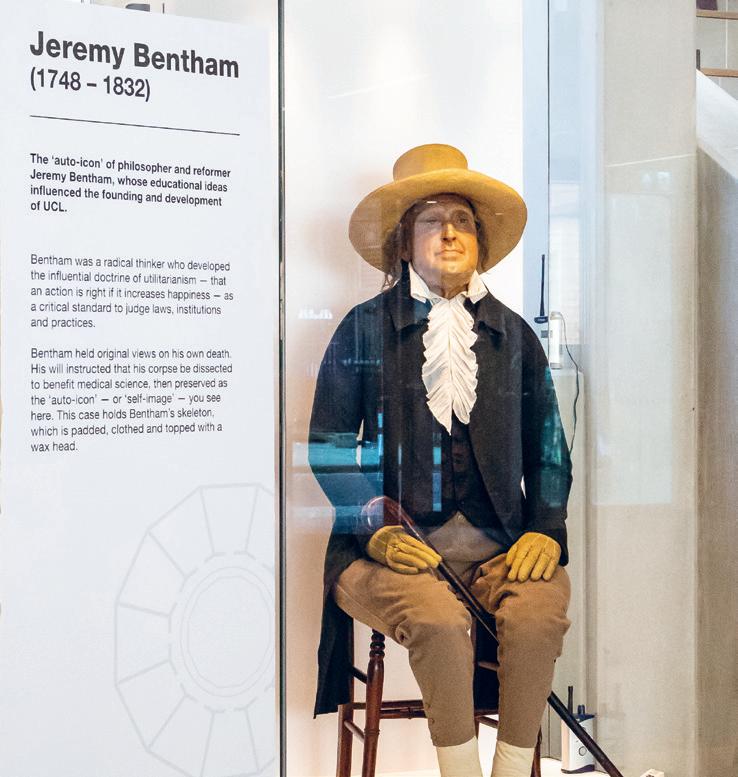
UCL East is home to a 160-seat cinema and art installation spaces, while we also have a treasured venue in the Bloomsbury Theatre – which hosts plays, live music and comedy – as well as performances by our students and staff.
UCL’s historic libraries, collections, museums and galleries – spanning everything from Egyptology to pathology, zoology to fine art – are actively used in teaching. The Grant Museum of Zoology, established on our Bloomsbury campus in 1828, reopened to the public in 2024 after an extensive improvement programme and includes new displays connecting the museum’s collections to biodiversity and conservation research, as well as showcasing how UCL research is responding to the planetary crisis.
Scan the NaviLens QR code, or search: ‘UCL Culture’ to find out more.




Our world-leading research, addressing the climate and ecological crises, informs the changes we’re making here at UCL. We hope to inspire a generation of change makers to take the lead on climate and sustainability action across the world.
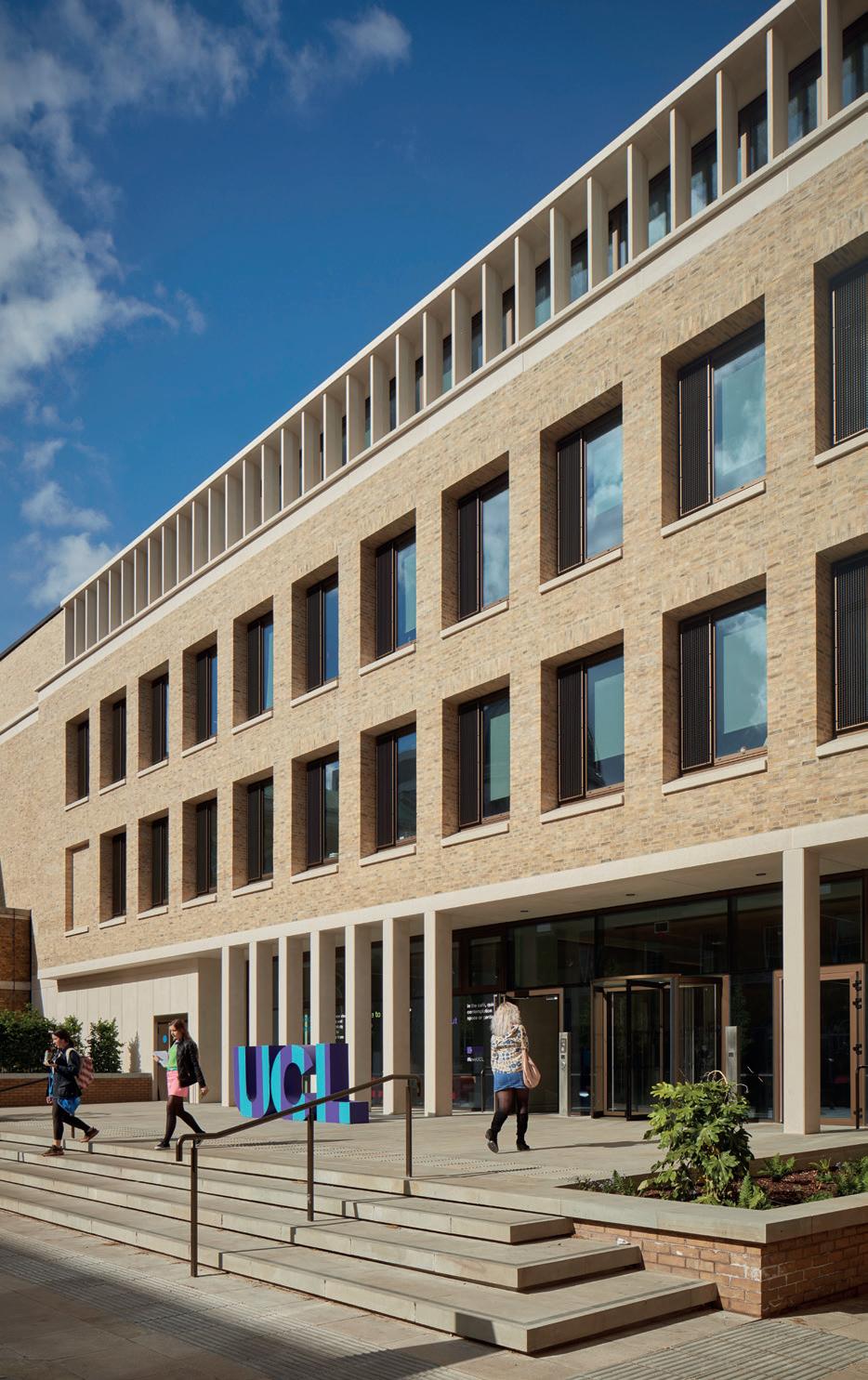

Sustainability is at the heart of how we operate. Ranked fifth in the world (and first in the UK) in environmental sustainability*, UCL’s award-winning sustainable campus is powered by 100% renewable electricity and we send no waste to landfill.
UCL East has been designed with sustainability at its core: by turning rubble into skateboard ramps, harvesting rainwater, using low energy lighting and highly efficient mechanical ventilation, we have worked to minimise the carbon footprint of the campus.
We are developing our next sustainability plan that will further embed sustainability across UCL, encompassing carbon emissions reduction, fostering biodiversity and advancing sustainable education and research.
As a student at UCL, you will have the opportunity to join one of our many sustainability societies, learn climate leadership skills through our Sustainability Ambassador Programme, and join events such as our monthly clothes swap shops.
We offer nearly 4,000 sustainability modules across the courses offered at UCL and through our teaching programmes, we pass on our knowledge of sustainability bestpractice to our students, to ensure that they become sustainability advocates to benefit the wider world.
*QS World University Rankings: Sustainability 2025
Scan the NaviLens QR code, or search: ‘Change possible UCL’ in YouTube to find out more.


Your life in London is a crucial part of your education and you will have the opportunity to study, live and play in not just one iconic part of London but two, with the opening of our campus in Stratford to complement our established home in Bloomsbury.

Bloomsbury itself is the historic home of Virginia Woolf and her ‘Bloomsbury Group’: writers, intellectuals, philosophers and artists who proudly challenged convention in both their lives and their work during the first half of the 20th century.
A wealth of knowledge and culture is on your doorstep at the world-renowned British Museum and British Library. And as part of London’s ‘Knowledge Quarter’, we are surrounded by more than 75 academic, research, cultural, media and technology institutions of all shapes and sizes – from Google to the Charles Dickens Museum.
On Queen Elizabeth Olympic Park in Stratford, UCL joins partners the BBC, Sadler’s Wells, UAL London College of Fashion and the V&A ( Victoria and Albert Museum) at East Bank, a new destination for London, with world-class culture and education at its heart.
In addition to the new UCL East campus, the university has teaching locations across the capital, including The School of Management in Canary Wharf, which has new facilities due to open from 2026.
With easy transport links across London, to the rest of the UK and continental Europe, there’s always something to do, see and learn.

We are equipping the next generation of bold thinkers with valuable opportunities for collaborative exchange as they rise to meet humanity’s greatest challenges.

Our UCL East campus in Stratford is made for collaboration. Whatever you choose to study – our innovative programmes offer a wide choice of modules developed with experts from business and industry – you will have the chance to get involved in projects in the local community, making an impression beyond the laboratory or lecture theatre and giving you vital skills for the workplace.
Surrounded by diverse minds and different cultural perspectives, you’ll make friends and create professional networks across a range of fields that will last throughout your lifetime and career.

The UCL East campus is set within an innovation district that brings technology and biodiversity together to create the sustainable cities of the future. It is home to a range of new UCL research centres, where you can study our groundbreaking degree programmes, dedicated to tackling some of the biggest challenges facing the planet.

Moving to a new city as a first-year undergraduate can be a major change, but you’ll find a warm welcome at UCL.



Join our hugely diverse student community, and you’ll make friends for life from all over the world at UCL. But first, you need a place to call home while you study. You will be prioritised for accommodation in your first year, as long as:
– you will be a single, first-year undergraduate, or are studying for a full academic year on Junior Year Abroad, Erasmus+ or Exchange programmes
– you apply for a single room (accommodation for couples and families is very limited)
– you have chosen UCL as your firm choice through UCAS by the deadline (currently 10 June of the cycle in which you applied)
– you submit your accommodation application online by the deadline (currently 10 June of the year of entry)
– you have not previously lived in London ( inside the M25 motorway) while studying at a university or higher education institution. (This does not include attending school in London)
Demand for accommodation in London is high, so we recommend applying as soon as possible once applications open.
Types of accommodation available
–
Catered accommodation in which meals are included ( breakfast and an evening dinner from Monday to Friday and brunch on Saturday and Sunday). You also have access to a small kitchen to prepare meals outside these times
– Self-catered accommodation with shared kitchen facilities where you prepare your own meals. Flats are equipped with a cooker, refrigerator, freezer, kettle, toaster and microwave
All UCL accommodation (see maps on p28–29) is offered for 39 weeks and is located in central London (Zones 1 or 2 of London’s public transport network).
The fees you pay vary depending on location and facilities. A guide to current fee ranges can be found on p92.
Students with additional requirements
UCL accommodation welcomes and supports applications from students with additional requirements. We will work with individuals to ensure they are allocated rooms that meet their needs.
This can include:
– Students with disabilities and health conditions
– Students that are care experienced or estranged. We will provide 365-day accommodation in the first year and, if needed, for subsequent years of study
Email accommodation@ucl.ac.uk for details.
Further details about accommodation can be found on p92.
Scan the NaviLens QR code, or search: ‘UCL accommodation’ to find out more.
* Climate Action Society
Bubble Tea Society
Ultimate Frisbee Club
Knitting Society
Gaming Society
Argentinian Tango Society
Dodgeball Club
Harry Potter Society
Juggling & Circus Society
Blockchain Labs Society
Space Society
K-POP Society
Karting Club Parkour Club
Graphic Novels & Comics Society
Medieval Society
Nature and Conservation Society
Yoga & Meditation Club
Vegetarian & Vegan Society
Hiking Club
Comedy Club
Sign Language Society
Artificial Intelligence Society
Art Society
Scan the NaviLens QR code, or search: ‘UCL Students’ Union’ to find out more.
Through our Students’ Union, you’ll make lifelong memories and make the most of London.


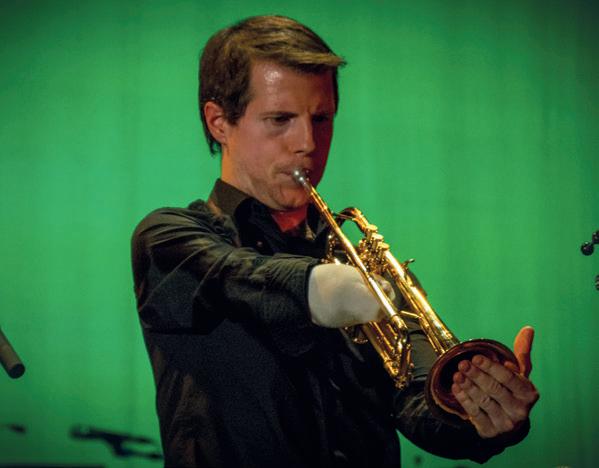
As soon as you join UCL you become a member of the Students’ Union and can start making the most of all the things it has to offer by joining any of the 430 student-led groups, including sports clubs, societies, liberation networks or volunteering projects. They’re your social group on campus, your support network and route to experiences you won’t find anywhere else.
With UCL’s multi-million-pound investment in transforming student life, we’re creating thousands more inclusive opportunities to play sport, explore the arts, volunteer and experience the amazing culture and diversity of our community.
TeamUCL is the collective name for all of our sports teams at UCL. They compete nationally against universities across the UK and there are lots of ways for you to get involved and play and train regularly. You can also stay active through the Union’s social sport programme, disability sport programme, or no-experience-necessary Project Active programme.
Beyond clubs and societies, the Union can help you find volunteering opportunities in London, lead projects to make positive change and give you impartial advice and support when you need it most.

“ The attitude at UCL is both fun and focused. You realise that the people you meet on your programme, in the Cloisters and halls will be future game-changers –as will you – and that is inspiring!”
Scan the NaviLens QR code, or search: ‘UCL alumni’ to find out more.
As a UCL student, you become a lifelong member of a truly global community. Our extraordinary alumni, with their bold, brilliant and inquisitive minds, go on to discover and achieve remarkable things across the globe.

Over 350,000 UCL alumni live in more than 190 countries worldwide. We count Nobel Prize winners, poets, novelists, BAFTA winners, Olympians, inventors and Turner Prize-winning artists among our graduates.
From your first day at UCL, this network is there to support and inspire you. Experienced alumni volunteers provide guidance as mentors and share their insights through panel discussions, skills workshops and internship opportunities.
You will also have the chance to make valuable contacts to accelerate your career at alumni-led networking events and social gatherings, in the UK and overseas.
Wherever life takes you after graduation, UCL’s global community will be there to support you. From social events and groups to professional development programmes, there’s no shortage of ways to stay connected with people who will support you to reach your next goal.

We are here to support you through any challenges you face while studying here, beginning with a wealth of resources to help new students prepare and settle in – including useful newsletters, apps and guides.


Our Transition Programme is designed to help you adapt to university life and includes access to a mentor and social sessions to help you find your feet. You’ll also be assigned a Personal Tutor, who can give you academic guidance and steer you towards any help you might need on practical and personal matters.
New international students are invited to a series of online orientation events before they arrive in the UK, followed by in-person orientation events that run the week before term starts.
If you need more support, UCL Student Support and Wellbeing offers information, advice and services to help all our students thrive. This includes free, easy-to-access mental health and wellbeing advisers, counselling, disability assistance, events to help you look after yourself and much more. We also have a dedicated team of department-specific Student Advisers, who are on hand to support first-year undergraduates.
Scan the NaviLens QR code, or search: ‘UCL wellbeing’ to find out more.

Career destinations of UCL graduates 15 months after graduation*
This shows the first career destinations of UK/EU students 15 months after their graduation from UCL in 2022. The median starting salary of those graduates in full-time work is £34,500.
High-skilled work (69%)
Postgraduate study (12%)
Other work (10%)
Other ^ (5%)
Unemployed (5%)
Other study (1%)
* All data taken from the Graduate Outcomes survey undertaken by the Higher Education Statistics Agency (HESA), looking at the destinations of UK and EU graduates in the 2021/22 cohort
^ ‘Other’ represents a grouping of activities in which personal circumstances or choice has influenced the graduate’s immediate options, this includes those: travelling (e.g. taking a gap year); looking after the home or family/ temporarily sick or unable to work; not employed but not looking for employment, further study or training; permanently unable to work or retired
We take your future ambitions seriously and provide you with the support you need to realise your full potential. UCL graduates are in-demand and more than 700 employers attend our careers events every year.
At UCL our team of experienced careers professionals is dedicated to helping you find the right path to ensure success in your future career. We provide support to help you find graduate jobs or further study positions and advise you on the opportunities you have during your time at UCL.
From your first day at UCL and up to three years after you graduate, you can access:
Whether you’re starting out with general queries, exploring options, writing applications or want support with preparing for specific interviews, our range of different in-person and online appointments will provide tailored one-to-one support.
Our employer connections
We are connected to thousands of employers in the UK and around the world. Recruiters and employers engage with us throughout the year to participate in a range of career events and activities, as well as providing job opportunities for UCL students.

There are regular opportunities, both on campus and online, to connect with employers and UCL alumni, where you can hear their perspectives on career paths and recruitment processes in a wide range of different sectors, as well as the skills and attributes you need to be successful.
You’ll find a wide range of curated resources related to your career planning, such as the Careers Discovery Feed, helping you to quickly identify key starting points for the areas you are researching.
We know students gain a variety of skills through internships and work experience. The myUCLCareers jobs board is updated regularly with internships and graduate roles, as well as opportunities available in London, the rest of the UK and internationally. You can opt in to receive regular email updates about new jobs on the system that meet your preferences. We also offer resources and funding support for students who would like to undertake an internship in another country.
“I was given exactly the advice and support I was hoping to get… as well as lots of websites and resources to help me with internship applications, CV and cover letter writing. I walked out knowing exactly what my next steps were.”
Chemistry BSc student, one-to-one appointment
Scan the NaviLens QR code, or search: ‘UCL careers’ to find out more.
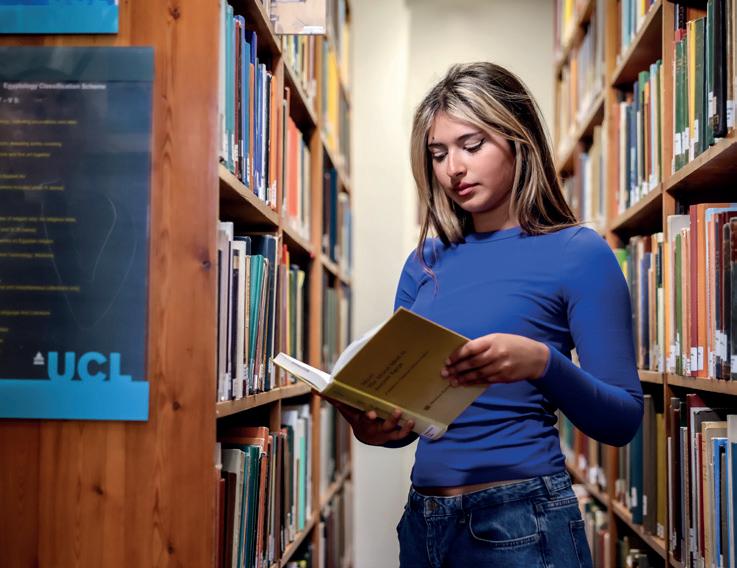



UCL is split into several faculties. Whichever programme you choose, you’ll be surrounded by fellow curious minds, learn from world-class academics and benefit from outstanding facilities. We provide a place to belong, be yourself and realise your potential.
Discover more about each faculty over the following pages.
Our faculty spans traditional humanities and the creative arts: Arts and Sciences (Liberal Arts), English, European and International Social and Political Studies, Fine Art, Greek and Latin (Classics), Hebrew and Jewish Studies, Information Studies, Modern Languages and Philosophy.
– UCL’s arts and humanities are ranked sixth in the world * and our ten departments offer more than 250 distinctive undergraduate degree programmes.
– Students have access to London’s vast range of cultural organisations, including the British Library, British Museum, the National Gallery, the British Film Institute and the Tate galleries.
– The faculty’s progressive approach to teaching and research is rooted in a vibrant, supportive and enabling community.
– We bring together over 30 languages to offer the widest range of language and language-related degrees in the UK.
* Times Higher Education World University Rankings by Subject 2024

You can find our programmes in:
– Arts and Sciences p58
– Economics, Geography, Politics and Social Sciences p65
– English and Comparative Literature p70
– Fine Art and Art History p71
– Historical and Philosophical Studies p72
– Languages and Cultural Studies p74

Whether your ambition is to design better buildings, plan better cities, build sustainable communities, or help meet the challenge of climate change, the Bartlett could help you realise it.


– The Bartlett is the UK’s largest multidisciplinary faculty of the built environment; it is ranked first in the world for architecture/built environment. *
– With a wealth of diverse resources, communities and history on our doorstep, our London setting puts us in a position to understand and directly impact the built environment field. We work with local communities and global organisations to find bold new solutions for pressing challenges facing London and cities around the world.
– The Bartlett Promise Scholarship helps to tackle the lack of diversity within the built environment by providing full funding and additional support for students from underrepresented groups.
* QS World University Rankings by Subject 2024
You can find our programmes in:
– Architecture, Construction and Planning p56
A global leader in research and education in the mind, brain, vision and hearing. We use our expertise to solve some of the world’s greatest health challenges, transforming society by reducing the burden of disease.

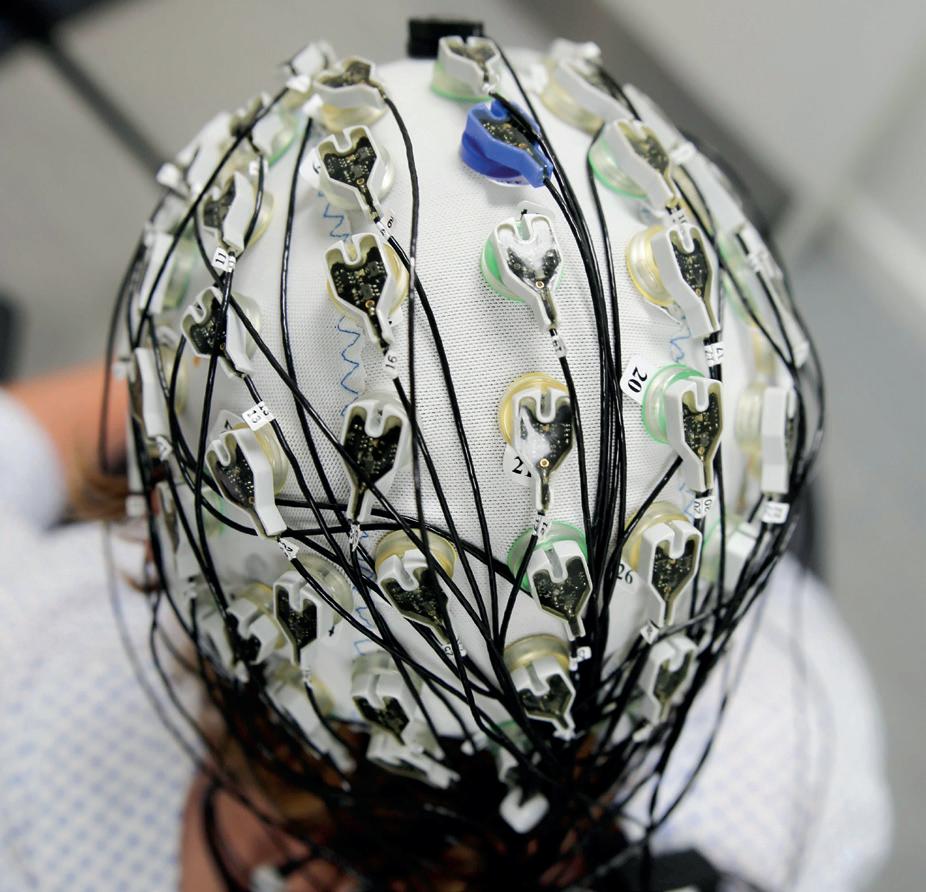
– UCL’s Faculty of Brain Sciences is the best in the UK for neuroscience, psychiatry and psychology, with more than two thirds of our research in these areas rated as world-leading (4*) .*
– We are home to some of the world’s most influential and creative researchers in the field of brain sciences: 17 of our faculty’s professors are named among the most influential in the world. ^
– UCL is fifth in Europe for linguistics and fifth in the world for psychology. **
* Research Excellence Framework (2021)
^ Clarivate Web of Science Highly Cited Researchers 2023
** QS World University Rankings by Subject 2024
You can find our programmes in:
– Medicine, Health and Allied Subjects p81
– Psychology and Language Sciences p85
The IOE has been ranked first in the world for education since 2014.* We offer a lens to examine society and understand more about the world, promoting equity and inclusion.
– Our research improves lives, from our study of early years education that has shaped policy around the world, to our collaborations with autistic people to translate research into action and our work with the United Nations to help address gender-based violence.
– Students are our most important collaborators. New ideas and new research are given meaning through your real-life experiences. Our graduates go on to influence future generations for the better, from individual lives to societal change.
– Whether in education or research, our work helps us to understand how and why people are different, what challenges this presents and what we can do to create a fairer, more just and more equitable society.
* QS World University Rankings by Subject 2014–2024

You can find our programmes in:
– Communications and Media p63
– Economics, Geography, Politics and Social Sciences p65
– Education p67
– Psychology and Language Sciences p85

Since its founding over 150 years ago, UCL Engineering has remained at the forefront of engineering innovation. We are uniquely interdisciplinary – home to courses across all of engineering, and beyond, including management, crime science and more.


– We do work that changes the world. Many essential technologies originated from studies and research projects at UCL, including the rapid production of vaccines, fibre-optic communications and the Internet infrastructure.
– We work closely with industrial partners, including Arup, Cisco, GSK, Google, Microsoft and Rolls Royce. This industry engagement provides our students with vital business skills, authentic experiences, and a network through which to kickstart their careers.
– We believe that good engineering happens when people with complementary skills work together. We’ve pioneered transformative approaches to education, such as the Integrated Engineering Programme (IEP) and the How to Change the World exercise, which encourages our students to think beyond disciplinary boundaries to solve global challenges collaboratively and creatively.
You can find our programmes in:
– Business and Management Studies p62
– Computer Science p64
– Economics, Geography, Politics and Social Sciences p65
– Engineering p68
– Physical Sciences p83
UCL Laws is an inclusive law school for the world: a diverse and progressive community of academics, researchers, students and alumni embedded in a leading research-oriented university in the heart of legal London.


– UCL Laws is consistently listed as one of the top law schools in the world, including first in the UK. *
– We have a strong commitment to small-group teaching and student support, with excellent graduate outcomes from one of the most highly respected and recognised qualifying law degrees in the common law world.
– Our students make a valuable contribution to society by undertaking a wide range of pro bono voluntary opportunities, for example, through the award-winning Centre for Access to Justice, which offers free legal services to those otherwise unable to afford them.
* The Guardian University Guide 2025 Subject League Table
You can find our programmes in: – Law p78
UCL Life Sciences offers an outstanding portfolio of programmes in biological and biomedical sciences, neuroscience, pharmacy, pharmacological and pharmaceutical sciences – studied in state-of-the-art facilities with world-renowned researchers and clinicians.

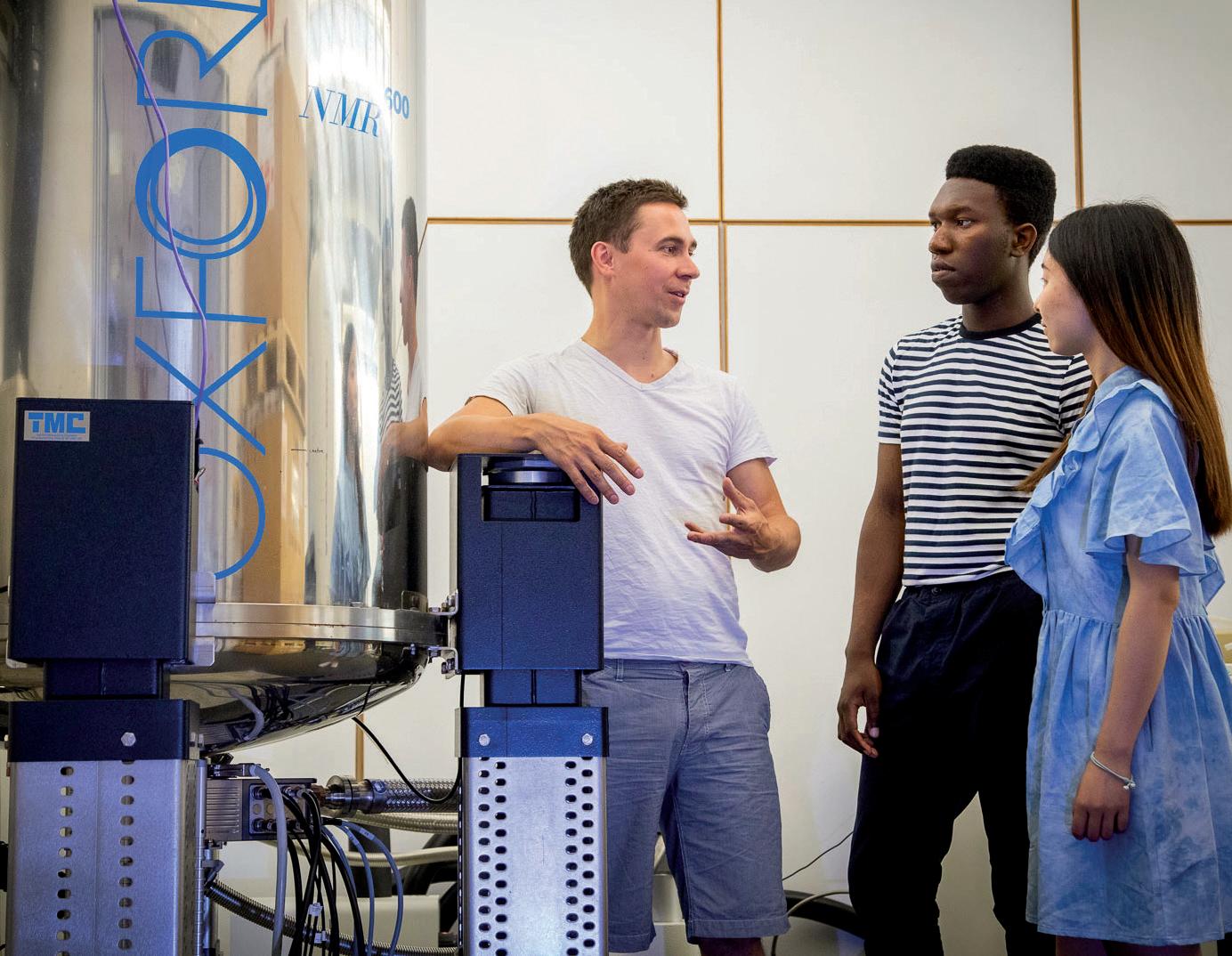
– Our world-class research institutes include the Centre for Biodiversity and Environment Research, the Institute for Healthy Ageing and the Sainsbury Wellcome Centre for Neural Circuits and Behaviour.
– UCL Life Sciences staff and students are actively engaged in research and innovation in global biodiversity, health, disease and pharmaceutics. Recent student entrepreneurs were awarded the Hult Prize, worth $1 million, for developing a sustainable and cost-saving approach to rice production.
– Associated with nine Nobel Prize winners over the years, today UCL Life Sciences continues to change the way we understand the world from the challenges of environmental change to the 3D printing of pharmaceuticals.
You can find our programmes in:
– Biological and Life Sciences p60
– Medicine, Health and Allied Subjects p81
The faculty encompasses the logical, experimental and mathematical study of our universe. Frontline research feeds directly into our teaching programmes, and our students benefit from access to outstanding facilities.

– Many of our departments rank in the top 10 for the Mathematical and Physical Sciences in the UK.*
– Our students and academics have been part of exciting discoveries, including new supernovas, water on habitable planets and the first images of a black hole.
– We are proud to count Dame Kathleen Lonsdale, UCL scientist, Quaker and pacifist, as one of our inspiring alumni. She conducted groundbreaking research in crystallography and in 1945 was one of the first women ever to be elected a Fellow of the Royal Society.
* QS World University Rankings by Subject 2024
You can find our programmes in:
– Economics, Geography, Politics and Social Sciences p65
– Historical and Philosophical Studies p72
– Mathematics and Statistics p79
– Physical Sciences (Chemistry, Earth Sciences, Natural Sciences, Physics and Astronomy) p83

We are at the forefront of fighting the world’s biggest health problems, from COVID-19 to cancer. Study one of our exciting programmes to launch your career in fields including medicine, medical diagnostics, pharmaceuticals, and public health.
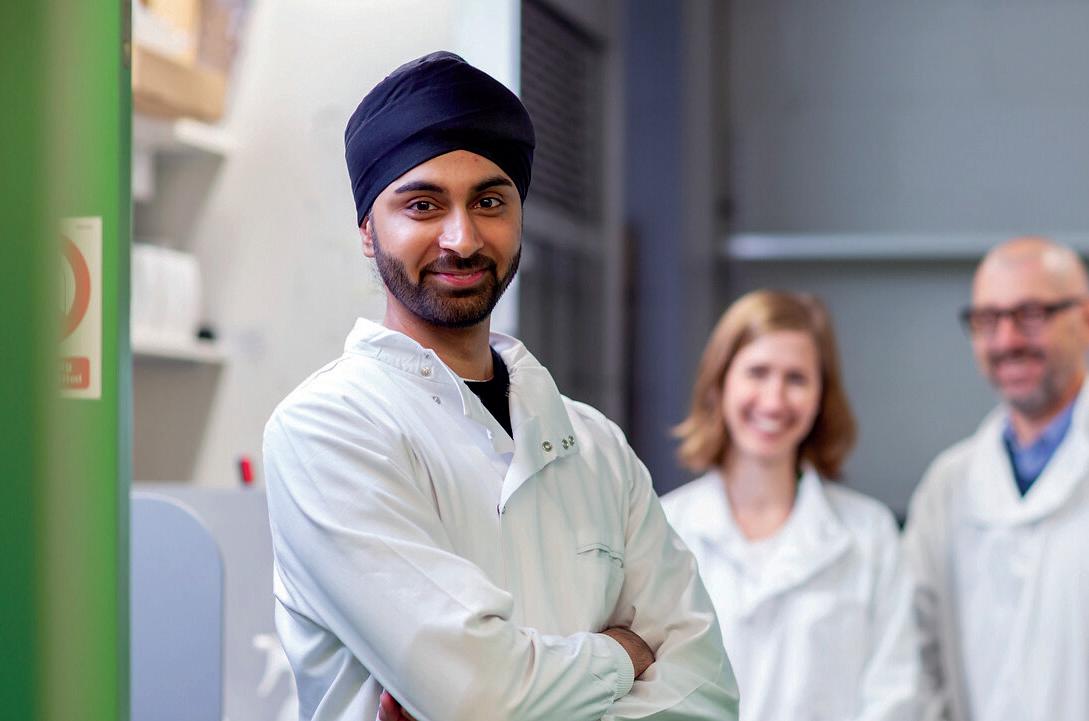

You can find our programmes in: – Biological and Life Sciences p60 – Medicine, Health and Allied Subjects p81
– UCL is ranked number one in London and sixth in the world for medicine. *
– Our MBBS is internationally renowned and our innovative BSc programmes are tailored to the needs of our changing world.
– Most of the BSc programmes in Medical Sciences have a shared first year. This gives you core knowledge and techniques, but also the flexibility to switch degrees if your interests change.
– Our groundbreaking research, leading academics and clinicians, cutting-edge facilities and outstanding partner hospitals and institutions create an unrivalled environment for medical sciences teaching and learning.
* QS World University Rankings by Subject 2024
We offer a learning environment that is rooted in cutting-edge research and academic excellence. Our staff are at the forefront of advancing knowledge in infectious diseases, heart disease and cancer. They are also contributing to innovations within healthcare management and addressing the health impacts of climate change.
– Our Population Health Sciences degrees will teach you to understand and address the pressing health issues of our time, harnessing the power of data to drive impactful change.
– The new Business and Health degrees integrate core business and health skills. They provide an interdisciplinary education with real-world applications and the flexibility to specialise in healthcare management or health science.
– UCL is ranked third in the world for public health * and we are the top-rated university in the Russell Group for research in medicine, health and life sciences. ^
– Our academics collaborate with world-renowned institutions including the World Health Organization, the NHS, Great Ormond Street Hospital and the Wellcome Trust, ensuring that the most up-to-date findings are being used to improve health systems and health outcomes around the world, as well as being taught in our classrooms.
* ShanghaiRanking Global Ranking of Academic Subjects 2024
^ Research Excellence Framework 2021

You can find our programmes in: – Medicine, Health and Allied Subjects p81
Our departments and institutes – Anthropology, Archaeology, the Americas, Economics, Geography, History, History of Art and Political Science – explore the social, political, economic, cultural and environmental processes that shape our world.
– We are intellectually diverse and world-leading, with our social sciences subjects ranked 14th in the world and our arts and humanities disciplines ranked 6th. *
– Our academics develop cutting-edge, crossdisciplinary research and education that has positive, real-world impact. We’ll challenge you to think in new ways, engage critically with global issues and look for creative solutions.
– Our students have unrivalled access to world-leading resources nearby, including the British Library, British Museum, the Wellcome Collection and the Warburg Institute, as well as on-site collections and remarkable facilities on campus.
– We’re proud that 91% of our graduates achieve a positive destination following their studies. Many go into graduate-level work or higher study in a variety of sectors, including financial services, consultancy, the creative arts and law. ^
* Times Higher Education World University Rankings by Subject 2024
^ G raduate Outcomes survey carried out by the Higher Education Statistics Agency (HESA), looking at the destinations of UK and EU graduates in the 2021/22 cohort
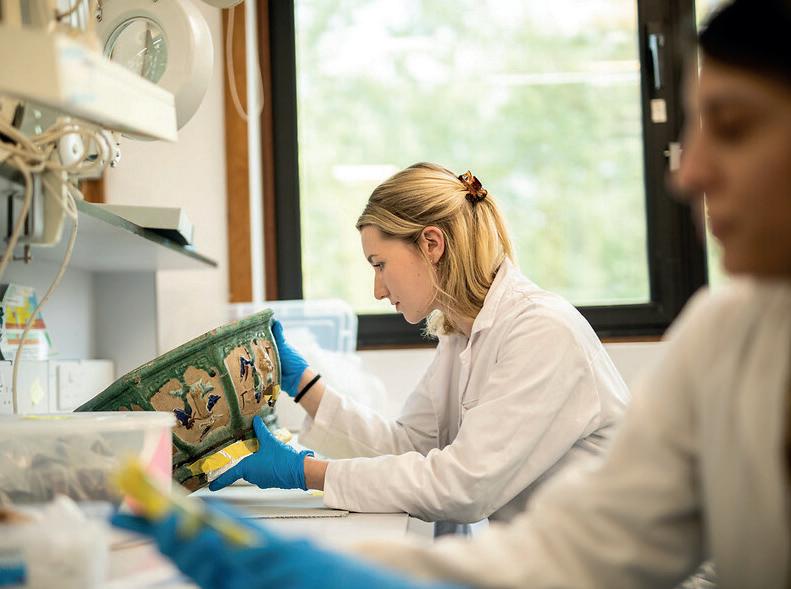
You can find our programmes in:
– Economics, Geography, Politics and Social Sciences p65
– Fine Art and Art History p71
– Historical and Philosophical Studies p72
– Languages and Cultural Studies p74


Browse more than 400 different programmes covering a huge range of subject areas.
Architecture, Construction and Planning p56 / Arts and Sciences p58 / Biological and Life Sciences p60 / Business and Management Studies p 62 / Communications and Media p63 / Computer Science p 64 / Economics, Geography, Politics and Social Sciences p65 / Education p67 / Engineering p68 / English and Comparative Literature p70 / Fine Art and Art History p71 /
Historical and Philosophical Studies p72 / Languages and Cultural Studies p74 / Law p78 / Mathematics and Statistics p79 / Medicine, Health and Allied Subjects p81 / Physical Sciences p83 / Psychology and Language Sciences p 85
Scan the NaviLens QR code, or search: ‘UCL Prospectus’ to find out more.
Choosing a degree programme that suits your passions and/or career aspirations can be challenging. The subjects you take can open up a wide variety of programmes beyond your core area that you may not have considered. Here are some ideas to inspire you.
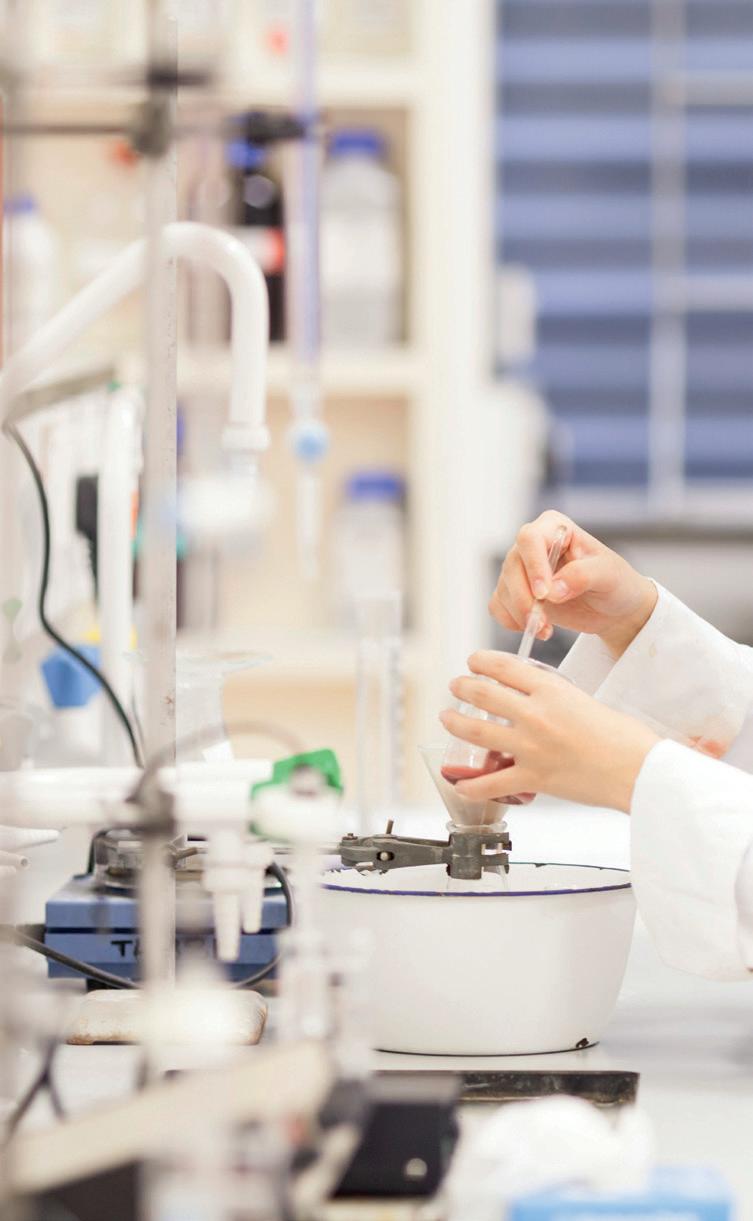
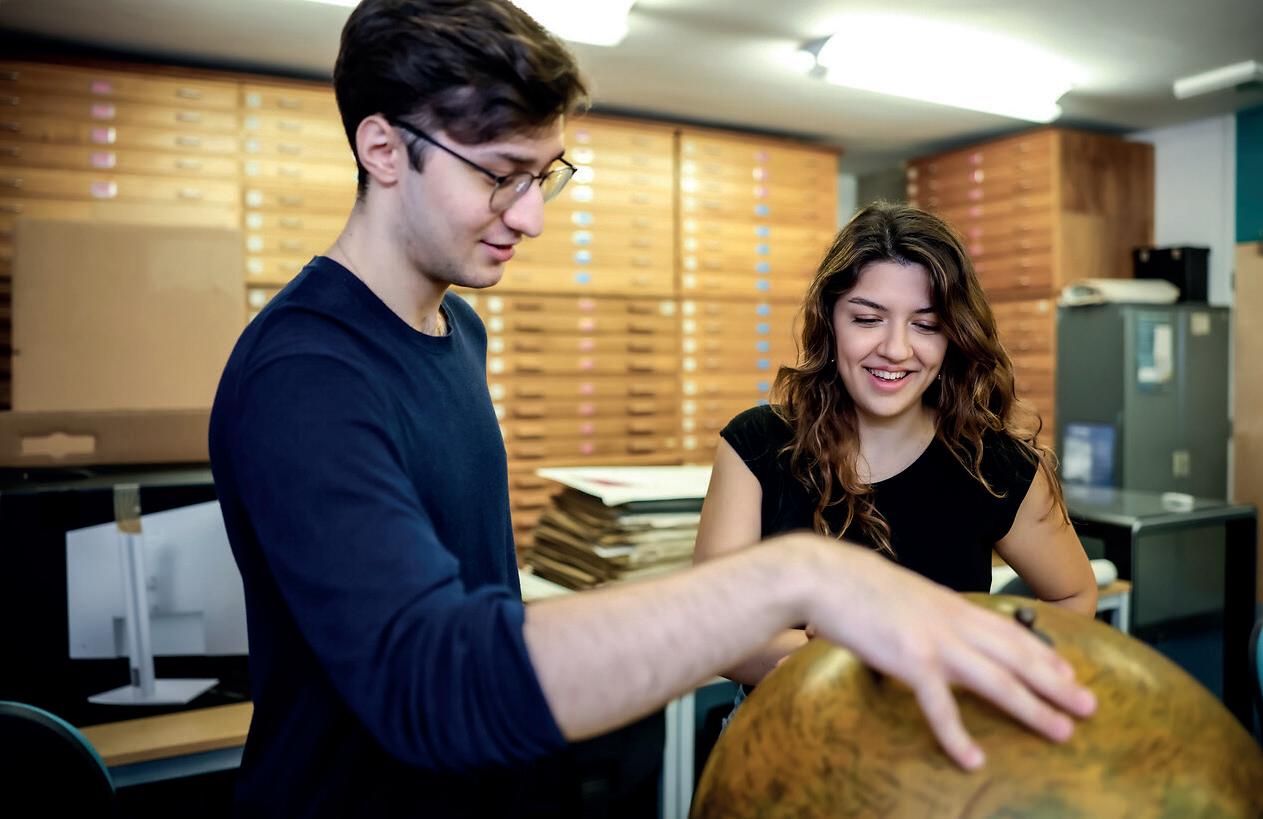
Love Geography? Study...
– Crime and Security Science BSc
– Environmental Geoscience BSc/MSci
– Global Humanitarian Studies BSc
– International Management BSc
– Population Health Sciences BSc/MSci
– Sociology BSc
– Urban Planning, Design and Management BSc
Love both arts and science subjects? Study...

Love History? Study...
–

Love Biology? Study... – Bioprocessing of New Medicines (Business and Management) BSc
– Business and Health BSc/MSci
– Human Neuroscience BSc
– Nutrition and Medical Sciences BSc
– Psychology and Language Sciences BSc/MSci
– Sport and Exercise Medical Sciences BSc
Love English? Study...
– Communications BA – Comparative Literature BA
– Creative Arts and Humanities BA
– Linguistics BA
Love Languages? Study...
– Ancient Languages BA
– Dutch and German BA
– French with Management Studies BA
– Italian and Polish BA
– Language and Culture BA
– Spanish and Portuguese BA

Love Chemistry? Study...
– Chemical Engineering BEng/MEng
– Earth Sciences BSc/MSci
– Geology BSc/MSci
– Natural Sciences BSc/MSci
– Pharmacy MPharm

Love Physics? Study...
– Astrophysics BSc/MSci
– Engineering and Architectural Design MEng
– Geophysics BSc/MSci
– Mechanical Engineering BEng/MEng
– Natural Sciences BSc/MSci
– Physics with Medical Physics BSc
Love Mathematics? Study...
– Civil Engineering BEng/MEng
– Computer Science BSc/MEng
– Data Science BSc
– Mathematical Computation MEng
– Philosophy and Computer Science BA
– Robotics and Artificial Intelligence MEng
– Sustainable Built Environments, Energy and Resources BSc/MEng
– Technology and Innovation BSc
We’re the Bartlett, UCL’s Faculty of the Built Environment. We work with students from around the world to imagine, plan, design and create a better built environment.

Studying with us at the Bartlett is about the bigger picture. It’s about excelling at an individual discipline within the context of many others and discovering specialisms, themes and passions that take you where you want to be. Whether your ambition is to design better buildings, plan better cities, build sustainable communities or help meet the challenge of climate change, our programmes could be a big step towards it.
First career destinations:
– CAD, drawing and architectural technicians
– Chartered architectural technologists, planning officers and consultants
– Civil engineers
– Environmental professionals
– Graphic and multimedia designers
Related programmes can be found in:
– Economics, Geography, Politics and Social Sciences p65
– Engineering p68
Did you know?
UCL is ranked first in the UK for architecture and the built environment.
QS World University Rankings by Subject 2024

Entry requirements:
Programme-specific entry requirements (including contextual offers and other qualifications) can be found at: ‘ucl.ac.uk/prospectus’ or scan the NaviLens QR code.
Architectural Studies
The Bartlett Faculty of the Built Environment
Architecture
The Bartlett Faculty of the Built Environment
Engineering and Architectural Design
The Bartlett Faculty of the Built Environment
Environment, Energy and Resources
The Bartlett Faculty of the Built Environment
Notes
UCL’s liberal Arts and Sciences (BASc) degrees provide enormous flexibility, allowing you to create a bespoke programme incorporating arts, social sciences and science subjects.

You’ll choose a major and a minor route, one from Cultures/Societies and one from Health and Environment/Sciences and Engineering. You’ll also study a language, plus ‘core courses’ specially designed to help you make links between different subject areas and provide you with the tools necessary for interdisciplinary study. An optional internship at the end of the second year will help to prepare you for the world of work. Innovative methods of teaching and assessment include vlogs, blogs and presentations.
First career destinations:
– Business associate professionals
– Business and related research professionals
– Chartered and certified accountants
– Management consultants and business analysts
– Finance and investment analysts and advisors
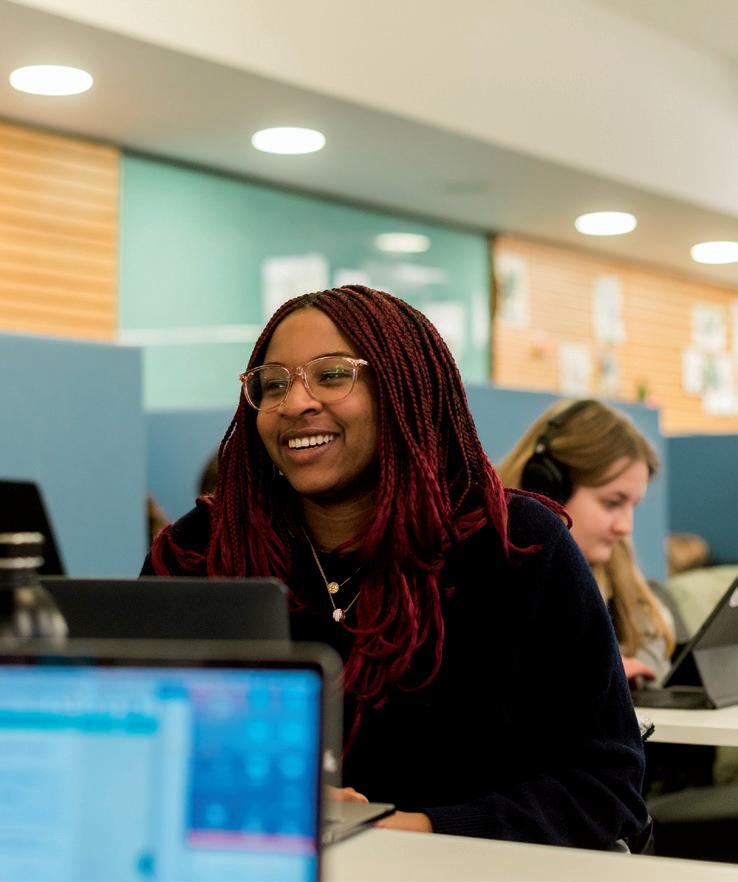
Entry requirements:
Programme-specific entry requirements (including contextual offers and other qualifications) can be found at:
ucl.ac.uk/prospectus’ or scan the NaviLens QR code.
Arts and Sciences
Faculty of Arts and Humanities
Notes
Students can select one major route from the list below. If you choose an Arts major route you will then choose a Science minor route, and vice versa if you choose a Science major route.
Art routes
Cultures
– Anthropology
Creative Writing
– Cultural Studies
– Design and Visualisation
– Drawing Methodology
– Film and Documentary Film-making
Societies
History of Art
Languages
Literature
Philosophy
Science routes
Health and Environment
Anthropology
Biochemistry
Biological Sciences
Biomedicine
Environmental Sciences
Sciences and Engineering – Archaeology
Economics
Geography – International Relations
Law
Management
Philosophy
Political Economy
Politics
Sociology
Chemistry
Computer Science
Earth Sciences
Economics
Geography
Geology
Neuroscience
Pharmacology
Psychology
Engineering
Mathematics
Physics
Statistics

At UCL our research in the biological and life sciences spans an incredible breadth of scientific areas.

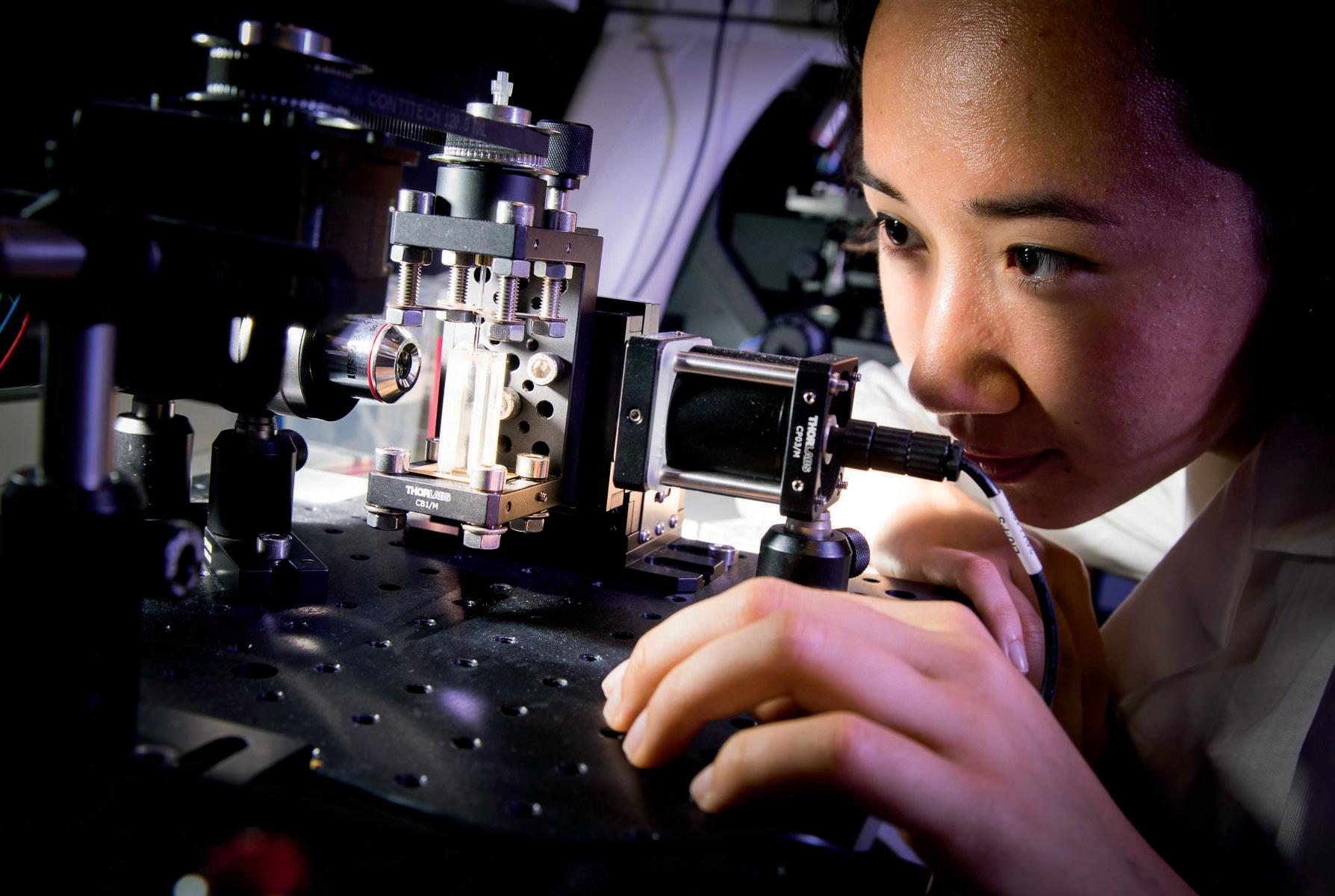
Did you know?
UCL is ranked fourth in the UK for life sciences and medicine.
QS World University Rankings by Subject 2024
From understanding the functioning of the brain through to structural, molecular, cell and developmental biology, genetics, biochemistry, pharmacology, ecology and biodiversity, we are finding answers to some of the most important and urgent problems facing humans and other animals. All our academic researchers are active teachers and educators. You can choose one of our broad entry programmes such as Biological or Biomedical Sciences, or focus your studies in a specialist degree.
First career destinations:
– Biochemists and biomedical scientists
– Biological scientists
– Business and related research professionals
– Business associate professionals
– Finance and investment analysts and advisors
Related programmes can be found in:
– Arts and Sciences p58
– Medicine, Health and Allied Subjects p81
– Physical Sciences p83

Programme-specific entry requirements (including contextual offers and other qualifications) can be found at: ‘ucl.ac.uk/prospectus’ or scan the NaviLens QR code.
Notes
Human
The UCL School of Management is developing entrepreneurial leaders for the next generation of data-driven, technology-intensive organisations.

Our programmes are developed in consultation with industry, with your future career in mind. On graduation, you will have strong leadership and communication skills and the ability to work flexibly, creatively and internationally in a range of areas, including banking and financial companies, consulting and tech. We offer exceptional support to our students in their search for a career, as well as a range of placement or internship options to give you hands-on experience to complement your study.
First career destinations: – Chartered and certified accountants
Data analysts – Finance and investment analysts and advisers
– Information technology professionals
– Management consultants and business analysts
Related programmes can be found in:
– Computer Science p64
– Engineering p68
Entry requirements:
Programme-specific entry requirements (including contextual offers and other qualifications) can be found at: ‘ucl.ac.uk/prospectus’ or scan the NaviLens QR code.
Our degrees set the benchmark for ambitious future communications and media professionals, combining the highest standards of academic and critical rigour with practice, state-of-the-art professional skills and an insight into a range of different communications and media.

Entry requirements:
Programme-specific entry requirements (including contextual offers and other qualifications) can be found at: ‘ucl.ac.uk/prospectus’ or scan the NaviLens QR code.
Through our Media BA, you will reach an advanced level in film-making or in digital game and interactive media, or both: two of the most important media forms for the UK economy. You will develop your own projects using brand-new, cutting-edge media studios based at UCL East in Stratford, and will exhibit your work in the end-of degree show.
On our Communications BA, you will explore the significant developments in visual, multimodal and multisensory communication, including digital media and technology, intercultural, online and inclusive communication.
First career destinations:
The first cohort of students admitted to the Media BA graduated in 2024. The first cohort of students admitted to the Communications BA are not due to graduate until 2028. Therefore, no first career destinations for students on these programmes are currently available.
Related programmes can be found in: – Economics, Geography, Politics and Social Sciences p65
Notes
First cohort due to graduate in
Studying computer science develops analytical and problem-solving skills fundamental to a huge range of careers in computing and beyond.

Our degrees, taught by world-leading researchers, provide a solid foundation in an ever-changing field. Teaching combines theory and practical sessions, with an emphasis on solving real-world problems. We collaborate with global computer companies, as well as financial, health and other sectors, via our pioneering industrial collaboration programme UCL IXN, to give you industry project experience and develop your team-working skills throughout your degree.
First career destinations:
– Actuaries, economists and statisticians
– Business and related research professionals
– Business associate professionals
– IT project managers
– Programmers and software development professionals
Related programmes can be found in:
– Business and Management Studies p62
– Mathematics and Statistics p79
Entry requirements:
Programme-specific entry requirements (including contextual offers and other qualifications) can be found at:
‘ucl.ac.uk/prospectus’ or scan the NaviLens QR code.
Computer
Notes
Foundation Year available (subject to conditions, see page 88).
Foundation Year available (subject to conditions, see page 88).
Foundation Year available (subject to conditions, see page 88).
First cohort due to graduate in 2027.
Degree programmes in this area examine individuals and society and the ways in which people behave and interact to influence the world around them.

Entry requirements:
Programme-specific entry requirements (including contextual offers and other qualifications) can be found at:
‘ucl.ac.uk/prospectus’ or scan the NaviLens QR code.
From the origins and evolution of the human species to social structures in the modern day; from cultural, political and economic systems to the relationships between natural and social worlds – our wide-ranging degrees allow you to take a truly interdisciplinary look at these fascinating subjects, preparing you for a huge range of career options across an area that has never been more relevant.
First career destinations:
– Actuaries, economists and statisticians
– Business and related research professionals
– Chartered and certified accountants
– Finance and investment analysts and advisers
– Management consultants and business analysts
Related programmes can be found in:
– Arts and Sciences p58
– Engineering p68
– English and Comparative Literature p70
– Historical and Philosophical Studies p72
– Languages and Cultural Studies p73
Entry requirements:
Programme-specific entry requirements (including contextual offers and other qualifications) can be found at: ‘ucl.ac.uk/prospectus’ or scan the NaviLens QR code.
Economics and Business Faculty of Arts and Humanities
European and International Social and Political Studies Faculty of Arts and Humanities
Notes
See the major subjects and major European languages you can study at: ucl.ac.uk/prospectus
See the major subjects and major European languages you can study at: ucl.ac.uk/prospectus
See the major subjects and major international languages you can study at: ucl.ac.uk/prospectus
Geography
Faculty of Social and Historical Sciences
Political Science
Faculty of Social and Historical Sciences
Politics and Sociology Faculty of Arts and Humanities
Risk and Disaster Reduction
Faculty of Mathematical and Physical Sciences
Social Sciences
IOE, Faculty of Education and Society
These
degrees prepare students to take a lead role in understanding and transforming society through the multifaceted lens of education.

Education is at the heart of global efforts to create more fair and equal societies. These interdisciplinary degrees draw on sociology, philosophy, psychology, history, youth studies and sustainability, to provide our students with the critical tools necessary to reflect on education as a dynamic force at the centre of social, cultural and political change.
First career destinations:
– Actuaries, economists and statisticians
– Arts officers, producers and directors
– Finance and investment analysts and advisors
– Primary education teaching professionals
– Welfare professionals
Related programmes can be found in:
– Economics, Geography, Politics and Social Sciences p65
– Psychology and Language Sciences p83
Entry requirements:
Programme-specific entry requirements (including contextual offers and other qualifications) can be found at: ‘ucl.ac.uk/prospectus’ or scan the NaviLens QR code.
Education IOE, Faculty of Education and Society
Notes
This degree does not offer a teaching qualification.
First cohort due to graduate in 2027.
This degree does not offer a teaching qualification.
This degree does not offer a teaching qualification.
First cohort due to graduate in 2028.
Engineers use insights and discoveries from across the academic spectrum to develop products and processes that truly change the world.
From vaccine manufacturing to designing ships and the distribution of sustainable energy, engineers solve problems for the good of humanity. Throughout your degree, you’ll learn the fundamentals of engineering with a focus on cross-team working, real-world scenarios and developing professional skills. Whichever discipline you choose to specialise in, you’ll be ready to make an impact in the world from the moment that you graduate.
First career destinations:
– Civil engineers
– Finance and investment analysts and advisers
– Mechanical engineers
– Production and process engineers
– Programmers and software development professionals
Related programmes can be found in:
– Architecture, Construction and Planning p56
– Business and Management Studies p62
– Economics, Geography, Politics and Social Sciences p65


Entry requirements:
Programme-specific entry requirements (including contextual offers and other qualifications) can be found at: ‘ucl.ac.uk/prospectus’ or scan the NaviLens QR code.
Biochemical Engineering
Faculty of Engineering Sciences
Biomedical Engineering
Faculty of Engineering Sciences
Chemical Engineering
Faculty of Engineering Sciences
Biochemical Engineering BEng
Biochemical Engineering MEng
Bioprocessing of New Medicines (Business and Management) BSc Biomedical Engineering BEng
Biomedical Engineering MEng
Did you know?
Sir Charles Kao (Electronic and Electrical Engineering) won the Nobel Prize in 2009 for his work on low loss optical fibres and their application to global communication systems.
Notes
Foundation Year available (subject to conditions, see page 88).
Foundation Year available (subject to conditions, see page 88).
Foundation Year available (subject to conditions, see page 88).
Foundation Year available (subject to conditions, see page 88).
Civil Engineering
Faculty of Engineering Sciences Electronic and Electrical Engineering
Faculty of Engineering Sciences
Chemical Engineering MEng
Chemical Engineering BEng Civil Engineering BEng Electronic and Electrical Engineering BEng Mechanical Engineering BEng Electronic and Electrical Engineering MEng Civil Engineering MEng
Foundation Year available (subject to conditions, see page 88).
Foundation Year available (subject to conditions, see page 88).
Foundation Year available (subject to conditions, see page 88).
Foundation Year available (subject to conditions, see page 88).
Foundation Year available (subject to conditions, see page 88).
Foundation Year available (subject to conditions, see page 88). Engineering and Public Policy
Faculty of Engineering Sciences
Mechanical Engineering MEng
Mechanical Engineering with Business Finance MEng
Foundation Year available (subject to conditions, see page 88).
First cohort due to graduate in 2026.
Foundation Year available (subject to conditions, see page 88).
Foundation Year available (subject to conditions, see page 88).
Foundation Year available (subject to conditions, see page 88).
With one of the most enduring and respected English departments in the country and an exceptional range of modern and ancient languages and interdisciplinary humanities on offer, UCL provides a stimulating environment for the study of literature and the creative arts.

Entry requirements:
Programme-specific entry requirements (including contextual offers and other qualifications) can be found at:
‘ucl.ac.uk/prospectus’ or scan the NaviLens QR code.
Comparative Literature
Our degrees require you to undertake careful critical and creative reading, reflection and writing. We aim to develop your analytical and interpretative skills, allowing you to develop a sensitivity to subtext and context.
Our new Creative Arts and Humanities BA –the first of its kind in the UK – is unique in bringing together creative writing, moving image and performance.
First career destinations:
– Advertising and marketing associate professionals
– Project support officers
– Public relations professionals
– Newspaper and periodical editors
– Musicians
Related programmes can be found in:
– Arts and Sciences p58
– Economics, Geography, Politics and Social Sciences p65
– Historical and Philosophical Studies p71
– Languages and Cultural Studies p74
Whether you’re a practitioner or a theorist, a creator or a critic, UCL offers outstanding staff, facilities and expertise across a variety of degree programmes in the prestigious Slade School of Fine Art and Department of History of Art.
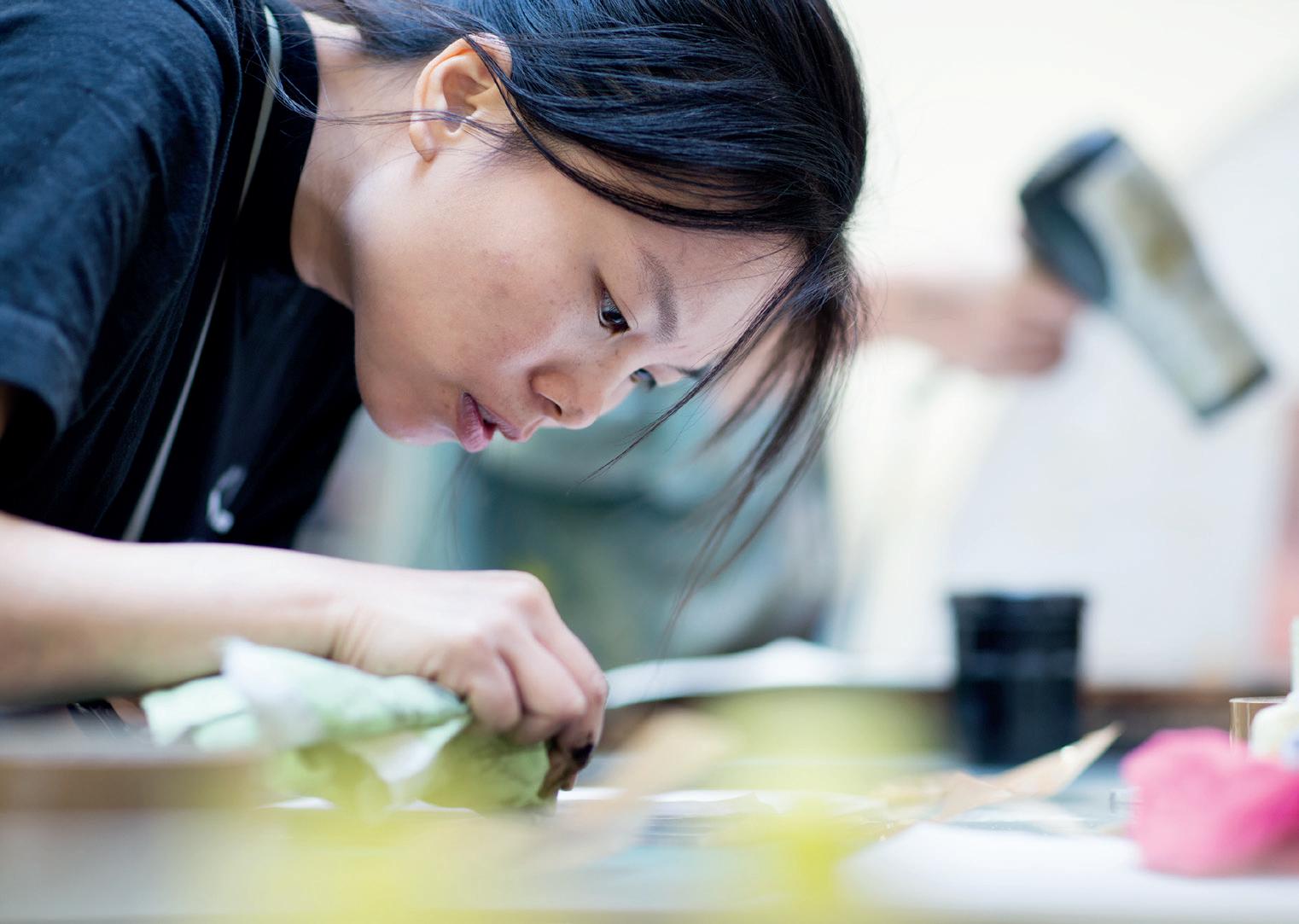
Entry requirements:
Programme-specific entry requirements (including contextual offers and other qualifications) can be found at: ‘ucl.ac.uk/prospectus’ or scan the NaviLens QR code.
Fine Art (Slade School of Fine Art)
Faculty of Arts and Humanities
A world-leading centre of scholarship in the history, practice and theory of art, our central location in London gives you easy access to national collections such as the Tate and National Gallery and a wealth of specialist and independent galleries and collections, not to mention UCL’s own museums and collections, to inform and enrich your learning. The Slade’s new Art and Technology BA, based at UCL East in Stratford, is focused on the interconnections between art and practice.
First career destinations:
– Archivists, conservators and curators
– Artists
– Graphic and multimedia designers
– Public relations professionals
Related programmes can be found in:
– Arts and Sciences p58
– Economics, Geography, Politics and Social Sciences p65
– Historical and Philosophical Studies p72
– Languages and Cultural Studies p73
This wide-ranging subject area covers everything from the history of the world, the ideas of philosophers – ancient and modern – and practical and analytical techniques for discovering how our ancestors lived.
Students on these degrees develop strong research and analytical skills and a sensitivity to different cultures and ideas. They learn to communicate effectively verbally, visually and in writing to diverse audiences. Studying these subjects could lead to careers in government and the civil service, international agencies and non-governmental organisations (NGOs), consultancy (economic, political risk and security, including within the AI sector and marketing) financial services, law, media, teaching, heritage and museums, as well as academia.
First career destinations:
– Business associate professionals
– Business and related research professionals
– Finance and investment analysts and advisors
– Human resources and industrial relations officers
– Management consultants and business analysts
Related programmes can be found in:
– Arts and Sciences p58
– Computer Science p64
– Economics, Geography, Politics and Social Sciences p65
– English and Comparative Literature p70
– Fine Art and Art History p71
– Languages and Cultural Studies p74
– Physical Sciences p83
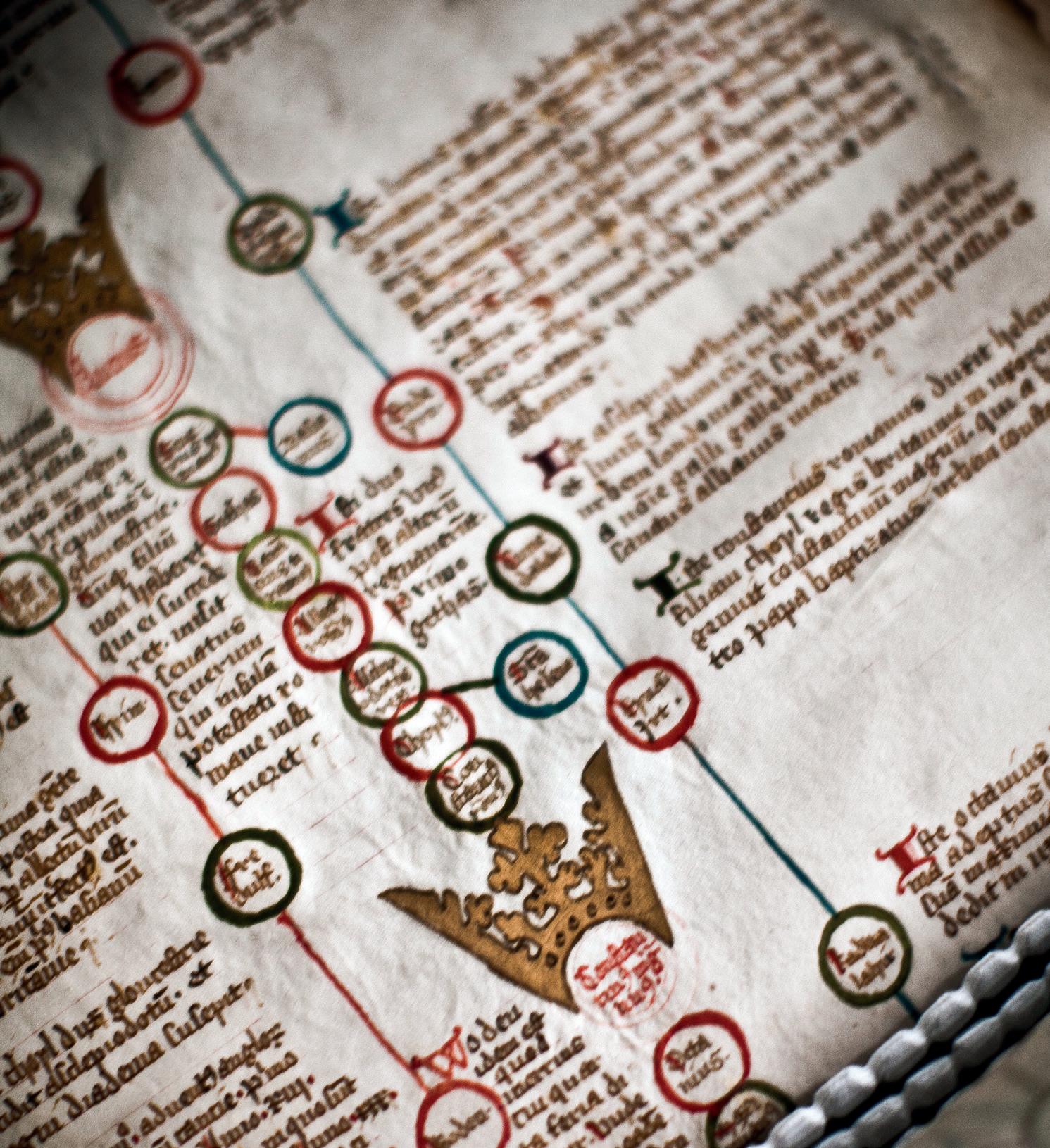
Entry requirements:
Programme-specific entry requirements (including contextual offers and other qualifications) can be found at: ‘ucl.ac.uk/prospectus’ or scan the NaviLens QR code.
Archaeology
Faculty of Social and Historical Sciences
Classics and the Ancient World
Faculty of Arts and Humanities
Archaeology BA
Archaeology BSc
Archaeology and Anthropology BA
Archaeology with a Placement Year BA
Archaeology with a Year Abroad BA
Classical Archaeology and Classical Civilisation BA
Classics and the Ancient World BA
Classics and the Ancient World with Study Abroad BA
Greek and English BA
Latin and English BA
History
Faculty of Social and Historical Sciences
History, Politics and Economics
Faculty of Arts and Humanities
Philosophy
Faculty of Arts and Humanities
Science and Technology Studies
Faculty of Mathematical and Physical Sciences
The Americas
Faculty of Social and Historical Sciences
Ancient History BA
History BA
History with a Year Abroad BA
History, Politics and Economics BA
Philosophy BA
Philosophy and Computer Science BA
Philosophy and Economics BA
Philosophy and History of Art BA
History and Philosophy of Science BSc
and Politics of Science BSc
History and Politics of the Americas BA
History and Politics of the Americas with a Year Abroad BA
Did you know?
4 years
3 years
QS World University Rankings by Subject 2024
Accreditation to be reviewed by CIfA/ UAUK in 2025
Accreditation to be reviewed by CIfA/ UAUK in 2025
Accreditation to be reviewed by CIfA/ UAUK in 2025
Accreditation to be reviewed by CIfA/ UAUK in 2025
Accreditation to be reviewed by CIfA/ UAUK in 2025
Accreditation to be reviewed by CIfA/ UAUK in 2025
First cohort due to graduate in 2028.
UCL offers a remarkable range of languages and associated cultural studies, including art, film, history, literature and linguistics, philology, philosophy and politics.

A degree in this area equips students with skills much sought after by employers, such as the ability to speak, understand and write in a foreign language; intercultural understanding; translation and communication skills; and critical and analytical rigour. You may choose languages that you have studied before or start others from scratch, depending on the programme. The year abroad, integral to most degrees, allows you to immerse yourself in another culture at one of our prestigious overseas partner institutions.
First career destinations:
– Authors, writers and translators
– Human resources and industrial relations officers
– Newspaper, periodical and podcast editors
– Protective service associate professionals
Did you know?
Languages offered to UCL students include Dutch, Finnish, Hindi, Hungarian, Italian, Mandarin, Norwegian, Yiddish and Ukrainian.

– Teachers of English as a Foreign Language
Related programmes can be found in:
– Arts and Sciences p58
– Economics, Geography, Politics and Social Sciences p65
– English and Comparative Literature p70
– Fine Art and Art History p71
– Historical and Philosophical Studies p72
Did you know?
English war correspondent Clare Hollingworth, the first to report on the Nazi invasion of Poland that triggered the Second World War, attended UCL’s School of Slavonic and Eastern European Studies in the 1930s.
Entry requirements:
Programme-specific entry requirements (including contextual offers and other qualifications) can be found at: ‘ucl.ac.uk/prospectus’ or scan the NaviLens QR code.
Modern language combinations
This grid shows the range of languages that can be combined (subject to entry requirements and availability) to create a four-year degree programme. The final degree awarded on completion will reflect whatever combination you choose, for example, Bulgarian and French BA, Italian and Spanish BA.
You can combine the study of two languages on an equal basis; either two languages that you have already studied, or one language at beginner’s level alongside one you already know.
French and Spanish are not available at beginner’s level within these combinations. If you wish to study French or Spanish from beginner’s level, you can apply for the Language and Culture BA (see below), where they are available as minor languages.
For most combinations, it is also possible to study two languages from beginner’s level if you have an A level (or equivalent) in any modern foreign language.
If you wish to combine two Scandinavian languages, please see the Scandinavian Studies BA (see p76) or Icelandic BA (see p76).
For guidance on how to apply, as well as the UCAS code for each language combination, please see: ucl.ac.uk/prospectus.
Notes
Entry requirements:
Programme-specific entry requirements (including contextual offers and other qualifications) can be found at: ‘ucl.ac.uk/prospectus’ or scan the NaviLens QR code.
UCAS Features Duration Programme
Notes
European Languages, Culture and Society Faculty of Arts and Humanities
Dutch and Latin BA
Dutch and Management Studies BA
Dutch and Philosophy BA
Dutch with Film Studies BA
Dutch with Management Studies BA
French BA
French and English BA
French and History of Art BA
R9Q6
4 years
R9V5 4 years
R9P3 4 years
R9N3 4 years
R100 4 years
R1Q3 4 years
R1V3 4 years
R1Q6 4 years
French and Latin BA 4 years R9N2
French and Philosophy BA
French with Film Studies BA
French with Management Studies BA
German BA
German and English BA
German and Hebrew BA
German and History of Art BA
German and Latin BA
German and Philosophy BA
German with Film Studies BA
German with Management Studies BA
Icelandic BA
Italian BA
Italian and History of Art BA
Italian and Jewish Studies BA
Italian and Latin BA
Italian and Management Studies BA
Italian and Philosophy BA
Italian Studies: UCL–Venice Double Degree BA
Italian with Film Studies BA
Scandinavian Studies BA
Scandinavian Studies and English BA
Scandinavian Studies and History of Art BA
Scandinavian Studies and Latin BA
R1V5 4 years
R1P3 4 years
R1N2 4 years
R200 4 years
R2Q3 4 years
R2Q4 4 years
R2V3 4 years
R2Q6 4 years
R2V5 4 years
R2P3 4 years
R2N2 4 years
R690 4 years
R300 4 years
R3V3 4 years
R3V6 4 years
R3Q6 4 years
RN32 4 years
R3V5 4 years
R301 4 years
R3P3 4 years
R600 4 years
R6Q3 4 years
R6V3 4 years
R6Q6 4 years
Entry requirements:
Programme-specific entry requirements (including contextual offers and other qualifications) can be found at: ‘ucl.ac.uk/prospectus’ or scan the NaviLens QR code.
Programme
European Languages, Culture and Society (cont)
Faculty of Arts and Humanities
Hebrew and Jewish Studies
Faculty of Arts and Humanities
Scandinavian Studies and Philosophy BA
Russian and East European Languages and Culture Faculty of Arts and Humanities
Key:
UCAS Features Duration
R6V5 4 years
Scandinavian Studies with Film Studies BA R6P3 4 years
Scandinavian Studies with Management Studies BA R6N2 4 years
Spanish and History of Art BA R4V3 4 years
Spanish and Latin BA R4Q6 4 years
Spanish and Latin American Studies BA R4T7 4 years
Spanish and Philosophy BA R4V5 4 years
Spanish with Film Studies BA R4P3 4 years
Spanish with Management Studies BA R4N2 4 years
Viking and Old Norse Studies BA R691 4 years
Ancient Languages BA 0R8U 3 years
Ancient Languages with Year Abroad BA RR8U 4 years
Hebrew and Jewish Studies BA Q481 3 years
Hebrew and Jewish Studies with Year Abroad BA Q480 4 years
History (Central and East European) and Jewish Studies with Year Abroad BA
VV23 4 years
Bulgarian and East European Studies BA R781 4 years
Czech (with Slovak) and East European Studies BA R782 4 years
Finnish and East European Studies BA RR67 4 years
Hungarian and East European Studies BA R783 4 years
Polish and East European Studies BA R784 4 years
Romanian and East European Studies BA R785 4 years
Russian Studies BA R700 4 years
Russian and History BA
RV71 4 years
Russian with an East European Language BA R715 4 years
Serbian/Croatian and East European Studies BA R786 4 years R788 4 years
Ukrainian and East European Studies BA
Notes
UCL Laws is consistently ranked as one of the UK’s top law schools, recognised for the quality of its teaching by both students and the legal profession.

Entry requirements:
Programme-specific entry requirements (including contextual offers and other qualifications) can be found at: ‘ucl.ac.uk/prospectus’ or scan the NaviLens QR code.
Through lectures, seminars and small group tutorial teaching, you can explore the principles of law and understand its role in governing the relations between the individual, the state, and society. You will be encouraged to develop a critical understanding of how the law works and how it can be changed. Students benefit from specialist career support and can choose to participate in an array of activities, including mooting, pro-bono opportunities and an exciting and varied events programme, organised in conjunction with the Student Law Society.
First career destinations:
– Legal professionals
– Legal secretaries
– Management consultants and business analysts
– Solicitors and lawyers
Related programmes can be found in:
– Economics, Geography, Politics and Social Sciences p65
Notes
LLB M141
Law Faculty of Laws M100
Law with French Law LLB M142 4 years Law with German Law LLB M144 4 years Law with Hispanic Law LLB
Bachelor of Law (UCL) and Bachelor of Law (HKU) LLB
So many activities and industries – engineering and science, business and finance, data science and computing – depend, in large part, on mathematical and statistical insights.
Our programmes will encourage you to develop your imagination and critical thinking abilities. They will enhance your ability to think strategically and argue clearly. You will gain advanced quantitative and computing skills, as well as honing your logical, analytical and problem-solving abilities, giving you a wealth of options for your future career. Our graduates go into a diverse array of careers and a large proportion go on to further study in both theoretical and applied fields.
First career destinations:
– Chartered and certified accountants
– Finance and investment analysts and advisers
– Management consultants and business analysts
– Programmers and software development professionals
– Teaching professionals
Related programmes can be found in:
– Arts and Sciences p58
– Computer Science p64
– Economics, Geography, Politics and Social Sciences p65
– Engineering p68
– Historical and Philosophical Studies p72
– Physical Sciences p83

Did you know?
The mathematical physicist
Sir Roger Penrose, who was awarded the Nobel Prize for Physics in 2020, graduated from UCL with a first-class degree in Mathematics.
Entry requirements:
Programme-specific entry requirements (including contextual offers and other qualifications) can be found at: ‘ucl.ac.uk/prospectus’ or scan the NaviLens QR code.
Mathematics
Faculty of Mathematical and Physical Sciences
Mathematics BSc
Mathematics MSci
Mathematics and Physics BSc
Mathematics and Physics MSci
Mathematics and Statistical Science BSc
Mathematics and Statistical Science MSci
Mathematics with Economics BSc
Mathematics with Economics MSci
Mathematics with Management Studies BSc
Mathematics with Management Studies MSci
Mathematics with Mathematical Physics BSc
Mathematics with Mathematical Physics MSci
Mathematics with Modern Languages BSc

UCAS
3 years G100
G107 4 years
GF13 3 years
GF1H 4 years
GG13 3 years
GGC3 4 years
G1L1 3 years
G1LC 4 years
G1N2 3 years
G1NF 4 years
G1F3 3 years
G1FH 4 years
G1T9 3 years
Notes
Statistical Science
Faculty of Mathematical and Physical Sciences
Data Science BSc
Statistics BSc
G1TX 4 years
Mathematics with Modern Languages MSci 3 years G300
years G305
Statistical Science (International Programme) MSci 3 years
Statistics and Management for Business BSc 3 years
Economics and Statistics BSc (Econ) 3 years
Statistics, Economics and Finance BSc
Statistics, Economics and a Language BSc
Understanding human health, the causes of and contributors to disease and the treatment of disease, is fundamental to our society. It necessitates study across human biology, medicine and the social sciences, requires creativity and is intellectually demanding.
Our degrees provide a host of options for careers across medicine and the biomedical sciences, including life as a doctor, research scientist, audiologist, pharmacist or a variety of other fulfilling science- or medicine-related professions. Our graduates will have a robust and fundamentally transferable skill set of critical analysis, data interpretation, communication and independent thinking.
First career destinations:
– Biochemists and biomedical scientists
– General medical practioners
– Pharmacists
– Pharmacy and optical dispensing
– Specialist medical practitioners
Related programmes can be found in:
– Arts and Sciences p58
– Biological and Life Sciences p60
– Engineering p68
– Physical Sciences p83
– Psychology and Language Sciences p85

Did you know?
Six former students and staff (Medicine, Health and Allied Subjects) have been awarded Nobel Prizes. Medical advances have included the discovery of adrenaline, the hormone aldosterone, growth-stimulating vitamins, and auto-immune disease.
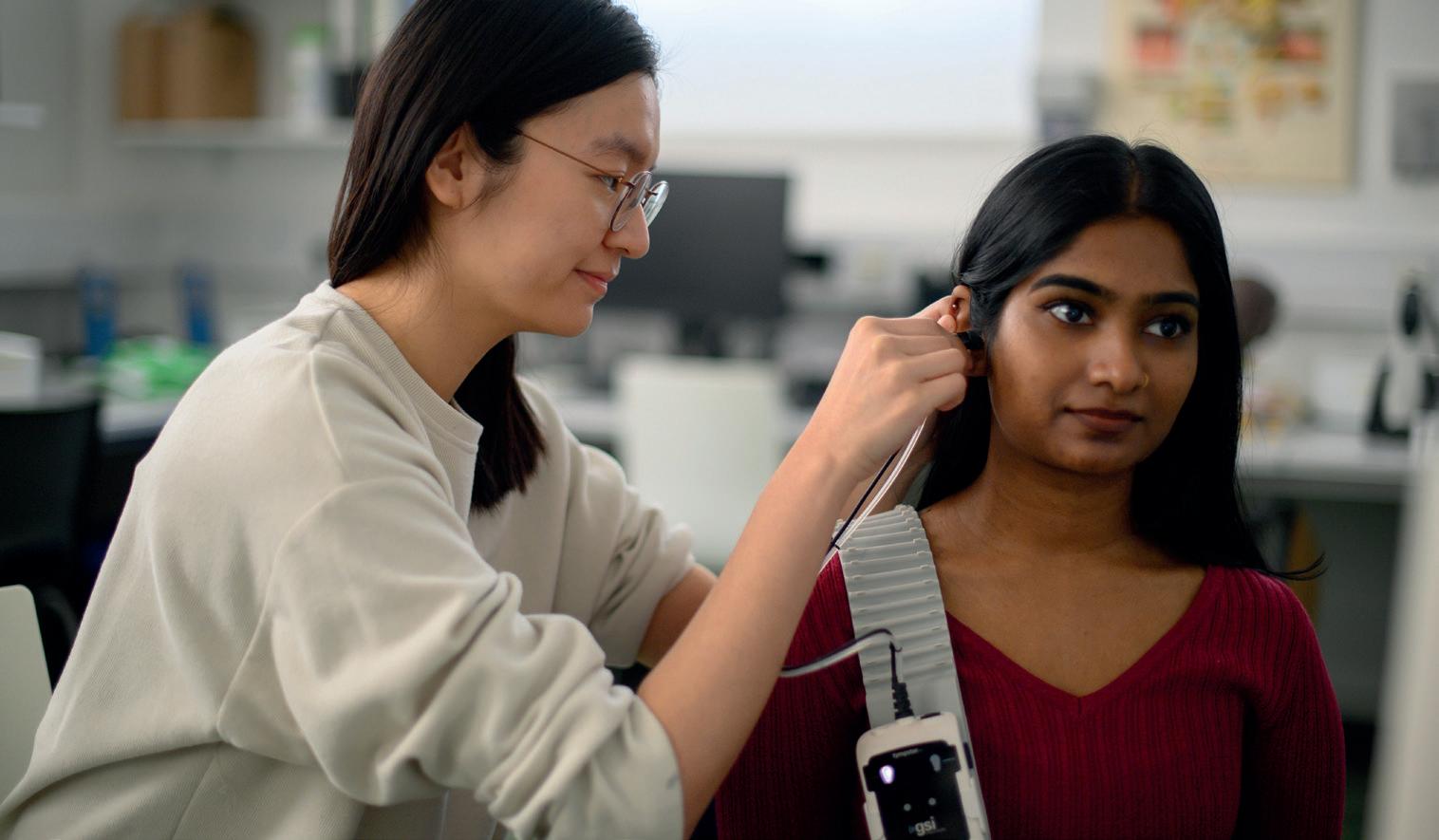
Entry requirements:
Programme-specific entry requirements (including contextual offers and other qualifications) can be found at: ‘ucl.ac.uk/prospectus’ or scan the NaviLens QR code.
Applied Medical Sciences
Faculty of Medical Sciences
Applied Medical Sciences BSc
Audiology BSc
Notes
First cohort due to graduate in 2025.
First cohort due to graduate in 2028.
First cohort due to graduate in 2029.
Cancer
Faculty of Medical Sciences
Medical Innovation and Enterprise
Faculty of Medical Sciences
Medicine
Faculty of Medical Sciences
Nutrition
Faculty of Medical Sciences
Pharmacy
Faculty of Life Sciences
of Population Health Sciences
Cancer Biomedicine BSc
Medical Innovation and Enterprise BSc
and Enterprise MSci
Medicine MBBS BSc Nutrition and Medical Sciences BSc
Pharmacy MPharm
with Integrated Foundation Training MPharm
Sciences BSc
Population Health Sciences MSci
This area covers the natural sciences linked to the study of non-living systems, forces and properties of the cosmos –from molecules to galaxy clusters, from the Earth’s core to the edge of the observable universe.

Study in these areas is renowned for developing highly sought-after analytical skills, the ability to undertake field and laboratory research and an understanding of mathematics and the principles and techniques of your chosen subject. A scientific training also equips you with practical transferable skills in rational argument and problem-solving, perfect for careers in areas such as research, design, development, computing, finance, planning and teaching.
First career destinations:
– Actuaries, economists and statisticians
– Chartered and certified accountants
– Finance and investment analysts and advisers
– IT business analysts, architects and systems designers
– Management consultants and business analysts
– Programmers and software development professionals
Related programmes can be found in:
– Computer Science p64
– Economics, Geography, Politics and Social Sciences p65
– Engineering p68
– Historical and Philosophical Studies p72
– Mathematics and Statistics p79
Entry requirements:
Programme-specific entry requirements (including contextual offers and other qualifications) can be found at: ‘ucl.ac.uk/prospectus’ or scan the NaviLens QR code.
Chemistry
Faculty of Mathematical and Physical Sciences
Earth Sciences
Faculty of Mathematical and Physical Sciences
Medical Physics
Faculty of Engineering Sciences
Natural Sciences
Faculty of Mathematical and Physical Sciences
Physics and Astronomy
Faculty of Mathematical and Physical Sciences
Chemistry BSc
Chemistry MSci
Chemistry (International Programme) MSci
Chemistry with Management Studies BSc
Chemistry with Management Studies MSci
Chemistry with Mathematics BSc
Chemistry with Mathematics MSci
Earth Sciences BSc
Earth Sciences MSci
Earth Sciences (International Programme) MSci
Environmental Geoscience BSc
Environmental Geoscience MSci
Geology BSc
MSci
Geophysics BSc
Geophysics MSci
Physics with Medical Physics BSc
Medical Physics MSci
Natural Sciences BSc
Natural Sciences MSci
Astrophysics BSc
Astrophysics MSci
BSc
Theoretical Physics BSc
Theoretical Physics MSci
Did you know?
In 2019, UCL researchers detected water vapour in the atmosphere of a super-Earth with habitable temperatures in a world first.
Notes
See the major and minor streams you can study at: ucl.ac.uk/prospectus
See the major and minor streams you can study at: ucl.ac.uk/prospectus
UCL
Our researchers cover a range of disciplines such as cognition, neuroscience, linguistics, education, communication, neurological disorders, mental health, phonetics and development across the human lifespan. You will have the chance to acquire quantitative and qualitative skills by critically evaluating research data and conducting your own research studies. In addition to subjectspecific skills you will also develop a range of highly transferable skills including problemsolving, communication, data analysis, writing for different audiences and critical thinking, which are essential for a range of graduate careers, which could include law, computing, healthcare, marketing, commerce and industry.
First career destinations:
– Advertising and marketing associate professionals
– Human resources and industrial relations officers
– Management consultants and business analysts
– Psychologists
Related programmes can be found in:
– Biological and Life Sciences p60
– Economics, Geography, Politics and Social Sciences p65
– Education p67
– Medicine, Health and Allied Subjects p81


Entry requirements:
Programme-specific entry requirements (including contextual offers and other qualifications) can be found at: ‘ucl.ac.uk/prospectus’ or scan the NaviLens QR code.
Throughout the programme pages we’ve used the following symbols:
This shows a selection of first career destinations for programmes in the section (excluding programmes from which the first cohort of students has not yet graduated), taken from the Graduate Outcomes survey carried out by the Higher Education Statistics Agency (HESA ) for 2021/22. The survey looks at what UK/EU graduates have gone on to do approximately 15 months after graduating from UCL.
Many of our degrees are interdisciplinary, working across two or more subject areas – so it’s possible that you’ll find programmes of interest in more than one section. We have indicated where there are overlaps so you can see the full choice of programmes available to you.
Programmes with study abroad as an integral part of the curriculum – for example, programmes in the Languages section – are marked with this symbol. Please note that you may also choose to study abroad as an option within many other programmes too.
This symbol indicates programmes where a placement or internship opportunity is an integral part of the curriculum – for example, the Pharmacy MPharm. Please note that many other programmes also offer optional placements or internships.
Many degrees are accredited by professional bodies, meaning that when you graduate you will either be eligible for membership, or will have fulfilled the academic requirements for membership, of the accrediting body. Our Law programmes are compliant with the QAA Subject Benchmark Statement for Law and contain the Foundations of Legal Knowledge. Completion of the Medicine MBBS BSc enables provisional General Medical Council (GMC) registration.
We know that the process can be daunting, so we’ve tried to make the information on the following pages as straightforward as possible. We’ve also provided details of where you can find more help and advice.
We’re seeking the brightest minds to join the UCL community and you must satisfy our specific entry requirements to study here.
For A levels, UCL typically makes offers in the range of A*A*A-ABB. For all programmes, you must have at least two A levels from our list of preferred subjects.
Please note that we do not consider General Studies, Critical Thinking or Global Perspectives and Research to meet the entry requirements for any of our programmes.
As well as A levels, we accept a wide range of other UK and overseas qualifications, for which requirements will be listed under each individual programme in the online prospectus.
Please note that for some programmes there may be additional admissions tests that will need to be taken. These will be indicated on the programme page in the online prospectus.
If you are not a national of a majority English speaking country (as defined by the UK Visas and Immigration, Home Office) you must provide recent evidence of your English proficiency. The English language requirements for each programme are shown on the relevant page in the online prospectus.
For more information about entry requirements (including GCSE requirements which vary across undergraduate programmes), accepted qualifications and English language requirements, see the NaviLens QR code above.
As part of our commitment to increasing participation from UK-based people in underrepresented groups, some students may be eligible for a contextual offer as part of the Access UCL scheme.
The contextual offer will be a lower offer than the standard UCL offer and is listed under each programme on the online prospectus page. For more information on eligibility criteria for the Access UCL scheme, visit: ucl.ac.uk/prospective-students/ undergraduate/access-ucl-scheme
The Engineering Foundation Year at UCL is for UK-based people who aspire to become an engineer but do not meet the standard entry requirements for UCL’s undergraduate engineering degrees.
To be eligible to apply, you must be attending or have attended a UK state school for your Level 3 qualifications (unless you have refugee status) and live in an area that has a high level of financial, social or economic deprivation, or low progression to higher education. For more information on eligibility criteria for the Engineering Foundation Year programme, visit: ucl.ac.uk/prospective-students/ undergraduate/degrees/engineeringfoundation-year
Scan the NaviLens QR code, or search: ‘UCL entry requirements’ to find out more.
If you’re inspired by what we offer and meet our entry requirements, we look forward to reading your application. Here’s what you need to do.
1. Find your degree programme
2. Apply online Applications open 1 September 2025
It’s important to research the degree programmes and universities that interest you before you make your choices. You can find out detailed information about each of our programmes by visiting ucl.ac.uk/ prospectus. You could also attend one of our Open Days, see ucl.ac.uk/openday
Undergraduate applications to UCL are made through UCAS. Our UCAS code is UCL U80; there is no campus code. Advice on completing your application, including fees, is on the UCAS website: ucas.com
For more information about the application process, including deadlines, please see the NaviLens QR code above.
Scan the NaviLens QR code, or search: ‘UCL undergraduate application’ to find out more.
3. Considering your application
For more information on how we assess applications and when we will respond, please see the NaviLens QR code above.
The selection criteria may vary across programmes at UCL. Each programme page on the online prospectus will have specific selection criteria including information about interviews, selection events or open days (if relevant).
We strive to admit the academically brightest students to UCL, regardless of background – those who are enthusiastic and passionate about learning, and who will make a positive contribution to university life and gain the most from their years of study here. In fact, UCL was founded to open up education in England for the first time to those who had been excluded from it. That commitment remains as strong today as it was back in 1826.
Our Equality, Diversity and Inclusion Policy and Strategy underlies every aspect of our student selection process. We want to admit excellent students who are likely to complete their degree programme successfully and derive benefit from it, regardless of age, disability, ethnic origin, gender identity, marital status, sex, sexual orientation, number of dependants and religious or political beliefs. We positively encourage and welcome applications from members of underrepresented groups at UCL.
UCL’s Access and Participation Plan (ucl.ac.uk/access) outlines our commitment to widening participation at UCL, including the Access UCL scheme (see p88).
If you think you may require a visa to study in the UK, you should visit: ucl.ac.uk/students/ immigration-and-visas
This provides more information about the types of visa, application processes and our requirements.
Our fees can vary depending on the modules you choose and your country of origin. Please take the time to familiarise yourself with the information below.
UCL’s annual tuition fee covers all elements of your tuition, registration and examination (field courses are not included). However, optional modules taken elsewhere in the University of London may attract an additional fee. Fees for accommodation are charged separately. UCL offers several ‘Dual Degree’ programmes where students spend half of their degree studying at UCL and the other half at a university overseas (these are distinct from Year Abroad or International programmes). In these cases, fees are payable to UCL for the time spent studying at UCL, and to the other host university for the time spent there. More details of these can be found at: ucl.ac.uk/prospectus
Please note that the information on this page applies to the 2025/26 academic year. Fees for 2026 entry will be published on the UCL Students website (ucl.ac.uk/students/feesand-funding) as soon as they are available.
How tuition fees are classified
The level of fee will depend upon whether you’re classed as a UK, Overseas or Islands student. You may already know into which category you fall but this will be confirmed if you are offered a place at UCL.
UK undergraduate fees are currently (January 2025) set at £9,535 for UK students for the first year of study. Fees for UK undergraduates may be subject to increase for the year commencing 2026 and for each year of study thereafter.
UCL reserves the right to increase its fees in line with government policy (including on an annual basis during the programme). You are not required to pay upfront fees. You can apply to the Student Loans Company for a Tuition Fee Loan and your fees will be paid directly to UCL on your behalf. Loan repayments are only made once you have left university and are earning over £25,000 per year. Please see gov.uk/student-finance for further information.
For 2025 entry, UCL’s tuition fees for overseas students range between £27,500 and £53,400 per year. The vast majority of our undergraduate programmes charge a fixed fee every year for overseas students (Medicine MBBS is an exception) and these won’t change during your time with us, so you know upfront exactly how much you’ll need to pay.
Scan the NaviLens QR code, or search: ‘UCL fees’ to find out more.
University is an
investment in your future. Depending on your circumstances, there are many sources of financial support to make higher education more accessible.
– Maintenance Loan from the Student Loans Company – see gov.uk/studentfinance
For students from Scotland, Wales or Northern Ireland, there is a different process and funding package available: Scotland – see saas.gov.uk Wales – see studentfinancewales.co.uk Northern Ireland – see studentfinanceni.co.uk
If you live in the Channel Islands or Isle of Man please contact your education authority for funding information.
–
UCL Undergraduate Bursary – this is a means-tested bursary of up to £3,000 per year – see ucl.ac.uk/scholarships
– UCL Scholarships – we have a range of schemes available each year based on financial need and/or academic merit –see ucl.ac.uk/scholarships
– Care Leaver and Estranged Student Bursary, aimed at students who are care experienced or estranged from parent(s) – see ucl.ac.uk/care-leaverbursary
– Disabled Students’ Allowance – see gov.uk/disabled-students-allowancesdsas
– Students with dependants – see gov.uk/student-finance/extra-help
– Employment – there are plenty of opportunities to find varied and reasonably paid part-time work in London. UCL Careers and the Students’ Union list opportunities on their websites.
Note for EU students: UK withdrawal from the European Union (EU)
The UK has now formally left the EU. Students covered by the EU Withdrawal Agreement may be able to access Tuition Fee Loans and Maintenance loans, depending on their status under the EU Settlement Scheme and their residency.
See ucl.ac.uk/scholarships for more details.
– UCL Scholarships – we have a range of schemes available – see ucl.ac.uk/scholarships
– External funding – external (non-UCL) organisations also offer funding support – see ucl.ac.uk/scholarships/ external-funding for examples.
– Tuition Fee Loan and help with living costs for EU students – you may be able to get a Tuition Fee Loan and help with living costs if you’re from an EU country, Iceland, Liechtenstein, Norway or Switzerland – see gov.uk/ student-finance/eu-students for more details.
– Employment – international students who require a visa or prior entry clearance are normally permitted to work for up to 20 hours per week during term time and full-time in the vacations. This restriction applies to voluntary as well as to paid employment – see ukcisa.org.uk for more information.
Scan the NaviLens QR code, or search: ‘UCL funding’ to find out more.
The UCL Financial Assistance Fund may be able to help if you experience unexpected financial hardship during your degree; there is also a short-term loan scheme for students whose funding has been delayed. Eligibility requirements apply – see ucl.ac.uk/students/ funding/financial-support for more details.
For further information
A good starting point for further information about student finance is gov.uk/studentfinance if you’re a UK student, or your local Ministry of Education if you’re an overseas student.
You can find out more about UCL fees and funding – see ucl.ac.uk/students/ fees-and-funding
Living costs may vary greatly from student to student, depending on individual needs and lifestyle. To guide you, UCL has estimations of how much students might spend on living costs – see ucl.ac.uk/scholarships/ how-much-does-it-cost-study-ucl
Additional costs on some degree programmes
Students on certain degree programmes will incur costs in addition to their tuition fees; for example, for materials or books, or costs related to carrying out fieldwork. For details about possible programmespecific additional costs and other expenses, such as travel between campuses, please see the relevant programme page in the online prospectus.
Food and accommodation are one of the biggest costs of studying at university, so you need to choose your options carefully to suit your needs and budget.
All the information you need about the application process and details of all our accommodation can be found online (see the NaviLens QR code, above). The majority of the accommodation available is managed by UCL. Some accommodation is managed by partners such as the University of London or private operators.
For the 2024/25 academic session, location zones and pricing bands were introduced for UCL accommodation. This pricing system is designed to help you to budget easily and to understand the quality of the accommodation and the distance from Bloomsbury campus when applying through the UCL Accommodation Portal.
The fees you pay vary depending on location and facilities. All of our accommodation fees include room rental and the following:
– Use of communal areas
– Maintenance within your hall
– Cleaning of shared bathrooms, kitchens and communal areas
– Utility charges, including Wi-Fi
– Basic contents insurance
– 24/7 support.
Additionally, when you move into UCL accommodation, you will become a part of a vibrant UCL community led by residents. Residents in halls can meet other students through Flourish, our residential life programme, which offers activities such as theatre outings, day trips, inter-hall sports tournaments and more.
Each of our sites has experienced and knowledgeable managers, hall teams
and Student Residence Advisers (SRAs) available to help you throughout your time in UCL accommodation. They run activities such as quizzes, movie nights and karaoke, as well as offering peer-to-peer wellbeing support and signposting, ensuring you have an exceptional student experience. All of our accommodation has secure access, as your security and wellbeing is our main priority.
The most up to date information about the pricing of our accommodation and the rooms available can be found online (see NaviLens QR code, above). We aim to keep our costs as low as possible within the constraints of rising utility bills and the general cost of living.
Zone locations and pricing bands for the 2024/25 session are detailed below:
Zones are based on the location of the hall
Zone A - Within a 1.5 mile radius of the UCL Quad, Bloomsbury
Zone B - Between 1.5-5 miles from the UCL Quad, Bloomsbury
Zone C - Over 5 miles from the UCL Quad, Bloomsbury
The majority of UCL accommodation will fit within Zone A.
Bands are based on the building condition
Band 1 - Newest build or recently refurbished to a high standard
Band 2 - Less recently refurbished or not all areas refurbished
Band 3 - Halls yet to be refurbished
Band 4 - Budget friendly rooms in Halls
Scan the NaviLens QR code, search ‘UCL accommodation’ or see p30–31 for more information.
that have not been refurbished.
As a guide, fee ranges for the 2024/25 session were as follows:
UCL catered accommodation
– Single room):
£225.33 to £284.90 per week
UCL self-catered accommodation
– Single room: £204.89 to £285.18 per week
– Single ensuite room: £275.24 to £344.82 per week
Fees for UCL accommodation are updated yearly and appear online as soon as they are set. Fees for halls operated by the University of London are set in the spring of the year of entry.
Find out more at ucl.ac.uk/accommodation or halls.london.ac.uk/accommodation
Most students look for privately rented accommodation in year two and beyond, often sharing with friends.
UCL partners with other providers such as University of London and private operators, that offer alternative accommodation available for returning students, the majority are located under four miles from our Bloomsbury campus. These rooms are offered at a special rate for UCL students, and so prices for the same properties may be higher on other websites.
Contact us at accommodation@ucl.ac.uk or @UCLAccommodation on Instagram and Facebook.
AAncient History BA V110 73
Ancient Languages BA 0R8U 77
Ancient Languages with a Year Abroad BA RR8U 77
Anthropology BSc L602 65
Anthropology with a Year Abroad BSc L603 65
Applied Medical Sciences BSc 9N53 82
Archaeology BA F400 73
Archaeology BSc F402 73
Archaeology and Anthropology BA FL46 73
Archaeology with a Placement Year BA F403 73
Archaeology with a Year Abroad BA F401 73
Architectural and Interdisciplinary Studies BSc K102 57
Architectural and Interdisciplinary Studies with a Year Abroad BSc K101 57
Architecture BSc K100 57
Architecture MSci K103 57
Art and Technology BA W102 71
Arts and Sciences BASc Y000 58
Arts and Sciences with Study Abroad BASc Y001 58
Astrophysics BSc F510 84
Astrophysics MSci F511 84
Audiology BSc B610 82
BBachelor of Law (UCL) and Bachelor of Law (HKU) LLB M103 78
Biochemical Engineering BEng H811 69
Biochemical Engineering MEng H813 69
Biochemistry BSc C700 61
Biochemistry MSci CC70 61
Biomedical Engineering BEng HC60 69
Biomedical Engineering MEng H160 69
Biological Sciences BSc C900 61
Biological Sciences MSci C901 61
Biomedical Sciences BSc B990 61
Bioprocessing of New Medicines (Business and Management) BSc CN72 69
Bulgarian combined with another language or discipline 75, 77
Business and Health BSc 172C 82
Business and Health MSci 173C 82
CCancer Biomedicine BSc B800 82
Chemical Engineering BEng H800 69
Chemical Engineering MEng H801 69
Chemistry BSc F100 84
Chemistry MSci F101 84
Chemistry (International Programme) MSci F105 84
Chemistry with Management Studies BSc F1N2 84
Chemistry with Management Studies MSci F1NF 84
Chemistry with Mathematics BSc F1G1 84
Chemistry with Mathematics MSci F1GC 84
Civil Engineering BEng H200 69
Civil Engineering MEng H202 69
Classical Archaeology and Classical Civilisation BA VQ48 73
Classics and the Ancient World BA Q802 73
Classics and the Ancient World with Study Abroad BA Q803 73
Communications BA P305 63
Comparative Literature BA Q200 70
Comparative Literature with a Year Abroad BA Q201 70
Computer Science BSc G400 64
Computer Science MEng G402 64
Construction Project Management MSci K223 57
Creative Arts and Humanities BA W800 70
Crime and Security Science BSc L311 65
Crime and Security Science MScI L313 65
Czech combined with another language or discipline 75, 77
Danish combined with another language 75
Data Science BSc G303 80
Dutch BA R911 75
Dutch combined with another language or discipline 75, 76
EEarly Childhood Education BA X302 67
Earth Sciences BSc F603 84
Earth Sciences MSci F604 84
Earth Sciences (International Programme) MSci F605 84
Economics BSc (Econ) L100 65
Economics with a Year Abroad BSc (Econ) L101 65
Economics and Business with East European Studies BA L1R7 66
Economics and Business with East European Studies with a Year Abroad BA L1RR 66
Economics and Statistics BSc (Econ) LG13 80
Education, Society and Culture BA X300 67
Electronic and Electrical Engineering BEng H600 69
Electronic and Electrical Engineering MEng H601 69
Engineering and Architectural Design
MEng KH11 57
English BA Q300 70
English combined with another language or discipline 75, 76
Environmental Geoscience BSc F644 84
Environmental Geoscience MSci F645 84
European Social and Political Studies BA R990 66
European Social and Political Studies: Dual Degree BA R992 66
Experimental Linguistics BSc Q102 86
Experimental Linguistics (International Programme) BSc Q103 86
Film Studies combined with a language 76, 77
Fine Art BA W100 71
Fine Art BFA W101 71
Finnish combined with another language or discipline 75, 77
French BA R100 76
French combined with another language or discipline 75, 76
Geography BA L700 66
Geography BSc F800 66
Geography and Economics BSc LL17 66
Geography (International Programme) BA L701 66
Geography (International Programme) BSc F801 66
Geology BSc F600 84
Geology MSci F601 84
Geophysics BSc F660 84
Geophysics MSci F663 84
German BA R200 76
German combined with a language or another discipline 75, 76
Global Humanitarian Studies BSc LL80 66
Greek and English BA Q7Q3 73
HHebrew and Jewish Studies BA Q481 77
Hebrew and Jewish Studies with a Year Abroad BA Q480 77
Hebrew combined with another language or discipline 75, 77
History BA V100 73
History (Central and East European) and Jewish Studies with Year Abroad BA VV23 77
History and Philosophy of Science BSc V550 73
History and Politics of the Americas BA T7V1 73
History and Politics of the Americas with a Year Abroad BA T7V2 73
History, Politics and Economics BA 4P47 73
History of Art BA V350 71
History of Art combined with a language or another discipline 73, 76, 77
History with a Year Abroad BA V104 73
Human Neuroscience BSc B142 61
Human Sciences BSc BCL0 61
Human Sciences and Evolution MSci BCL1 61
Hungarian combined with another language or discipline 75, 77
IIcelandic BA R690 76
Infection and Immunity BSc C550 61
Information in Society BSc GL00 66
Information Management for Business BSc P1N1 62
International Social and Political Studies BA LV01 66
International Management BSc N290 62
Italian BA R300 76
Italian combined with another language or discipline 75, 76
Italian Studies: UCL–Venice Double Degree BA R301 76
JJewish Studies combined with another language or discipline 76, 77
LLanguage and Culture BA R991 75
Latin and English BA Q6Q3 73
Latin combined with another language 76, 77
Law LLB M100 78
Law with French Law LLB M141 78
Law with German Law LLB M142 78
Law with Hispanic Law M144 78
Linguistics BA Q100 86
Linguistics (International Programme) BA Q101 86
MManagement Science BSc N991 62
Management Science MSci N990 62
Management Studies combined with a language 76, 77
Mathematical Computation MEng G430 64
Mathematics BSc G100 80
Mathematics MSci G107 80
Mathematics and Physics BSc GF13 80
Mathematics and Physics MSci GF1H 80
Mathematics and Statistical Science
BSc GG13 80
Mathematics and Statistical Science
MSci GGC3 80
Mathematics with Economics BSc G1L1 80
Mathematics with Economics MSci G1LC 80
Mathematics with Management Studies
BSc G1N2 80
Mathematics with Management Studies
MSci G1NF 80
Mathematics with Mathematical Physics BSc G1F3 80
Mathematics with Mathematical Physics
MSci G1FH 80
Mathematics with Modern Languages BSc G1T9 80
Mathematics with Modern Languages
MSci G1TX 80
Mechanical Engineering BEng H300 69
Mechanical Engineering MEng H301 69
Mechanical Engineering with Business Finance
MEng H1NH 69
Media BA P300 63
Medical Physics MSci F350 84
Medical Innovation and Enterprise BSc B980 82
Medical Innovation and Enterprise MSci B981 82
Medicine MBBS BSc A100 82 N
Natural Sciences BSc CFG0 84
Natural Sciences MSci FGC0 84
Neuroscience BSc B140 61
Neuroscience MSci B141 61
Norwegian combined with another language 75
Nutrition and Medical Sciences BSc B400 82
Pharmacology BSc B210 61
Pharmacology MSci B211 61
Pharmacy MPharm B230 82
Pharmacy with Integrated Foundation Training MPharm B231 82
Philosophy BA V500 73
Philosophy and Computer Science BA VG52 73
Philosophy and Economics BA VL51 73
Philosophy and History of Art BA VV53 73
Philosophy combined with a language 76, 77
Philosophy, Politics and Economics BSc 4V86 66
Physics BSc F300 84
Physics MSci F303 84
Physics combined with Mathematics 80
Physics with Medical Physics BSc F351 84
Polish combined with another language or discipline 75, 76
Politics and International Relations BSc L251 66
Politics, Sociology and East European Studies BA LR27 66
Politics, Sociology and East European Studies with a Year Abroad BA LRF7 66
Population Health Sciences BSc 170C 82
Population Health Sciences MSci 174C 82
Portuguese combined with another language 75
Psychology BSc C800 86
Psychology MSci C810 86
Psychology and Language Sciences BSc CB86 86
Psychology and Language Sciences MSci CB87 86
Psychology with Education BSc C801 86
R
Robotics and Artificial Intelligence MEng H700 64
Romanian combined with another language or discipline 75, 77
Russian Studies BA R700 77
Russian combined with another language or discipline 75, 77
S
Scandinavian Studies BA R600 76
Scandinavian Studies combined with another discipline 76, 77
Science and Engineering for Social Change BSc B191 69
Serbian/Croatian combined with another language or discipline 75, 77
Social Sciences BSc L300 66
Social Sciences with Data Science BSc LG33 66
Sociology BSc L301 66
Sociology and Politics of Science BSc L391 73
Spanish combined with another language or discipline 75, 77
Sport and Exercise Medical Sciences BSc BC16 82
Statistical Science (International Programme)
MSci G305 80
Statistics BSc G300 80
Statistics and Management for Business BSc GN32 80
Statistics, Economics and Finance BSc GLN0 80
Statistics, Economics and a Language BSc GLR0 80
Sustainable Built Environments, Energy and Resources BSc K300 57
Sustainable Built Environments, Energy and Resources MEng K301 57
Swedish combined with another language 75
T
Technology and Innovation BSc N295 62
Theoretical Physics BSc F340 84
Theoretical Physics MSci F345 84
U
Ukrainian combined with another language or discipline 75, 77
Urban Planning and Real Estate BSc K430 57
Urban Planning, Design and Management BSc K421 57
Urban Studies BSc K440 57
V
Viking and Old Norse Studies BA R691 77
Y
Yiddish combined with another language 75
Youth, Society and Sustainable Futures BA X313 67
Access UCL 07, 88–89
Accommodation 28–31, 92
Additional admissions tests 88
Alumni 34–35
Applying 89
Bursaries 07, 91
Campuses and facilities 18–23, 26–27
Care leavers 91
Careers 38–39
Clubs and societies 05, 32–33
Contextual offers 07, 88–89
D
Degree programmes 52–87
Disabled Students’ Allowance 91
Disclaimer inside back cover
East Bank 25
Engineering Foundation Year 64, 66, 69, 88
English language requirements 88
Entrepreneurship 16–17
Entry requirements 88
Equality and diversity 89
Faculties 40–51
Fees 90
Financial support and funding 91
International students 37, 88–91
K
Knowledge Quarter 27–29
L
Libraries inside front cover, 21, 28–29, 40, 52
London inside front cover, 05, 09, 24–29, 31, 96
M
Maps inside front cover, 28–29
Museums and galleries inside front cover, 20–21, 25, 28–29, 41
N
NaviLens Accessible QR code introduction inside front cover
Nobel Prize winners 05, 10–11, 35, 47, 69, 79, 82
O
Open Days 89, 96
P
Personal Tutors 37
R
Research Excellence Framework (REF) 05
S
Scholarships 91
Selection procedure 89
Social activities 32–33, 35
Sports 32–33
Students’ Union UCL 32–33, 91
Support services 17, 37, 91–92
Sustainability 05, 15, 20, 22–23
T
Transition Programme 37
Travel and directions 28–29, 96
U
UCAS – applying through 89
V
Visits 96
W
Widening participation 89, 96
There’s always something exciting going on at UCL and our central London location makes finding us easy. We look forward to meeting you.
Our next UCL Undergraduate Open Days will be hosted both online and in person. Our Virtual Open Events, from 21 to 25 April 2025, are packed with subject admissions talks providing you an insight into our degree programmes. You will have the opportunity to speak to admissions staff and academic tutors and also interact with current students to find out what studying at UCL is really like.
Our in-person Open Days on 27 and 28 June 2025 will allow you to experience and explore the Bloomsbury and East campuses and meet with UCL staff and students.
See ucl.ac.uk/openday for more details.
To find out more about other opportunities to visit our campus, talk to student and staff, book a tour or details of Higher Education fairs, schools and country visits, visit ucl.ac.uk/prospective-students
If you have a general enquiry about UCL and our degree programmes, feel free to contact us:
study@ucl.ac.uk
+44 (0)20 3108 8520
UCL runs a range of summer schools, taster days and other activities for UK-based prospective students from underrepresented groups. To find out more, including the eligibility criteria for these, visit: ucl.ac.uk/widening-participation
Whether you’re coming from elsewhere in London, the UK or overseas, it’s easy to get to us. See ucl.ac.uk/maps/public-transport for directions.




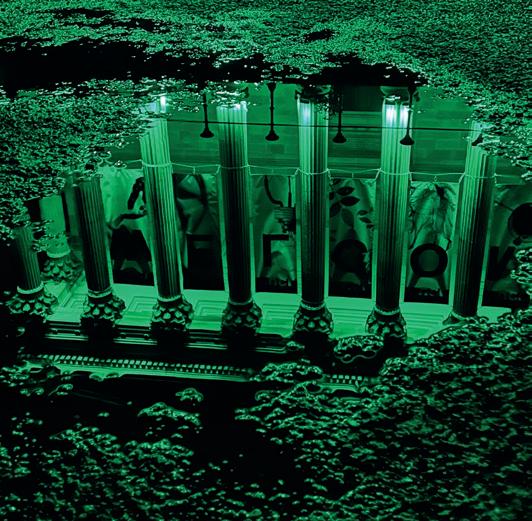
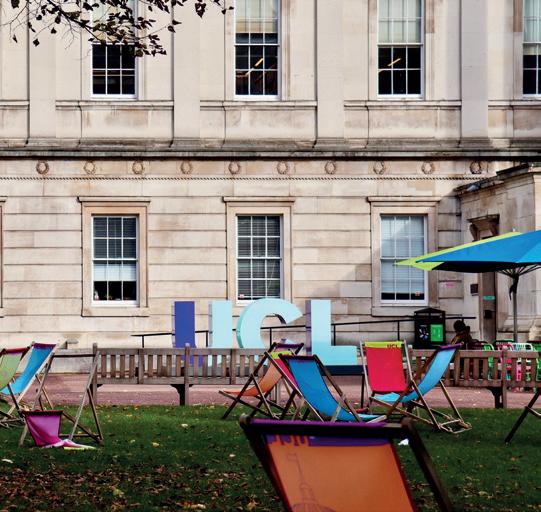
Featured here are some of our favourite entries for the #LoveUCL Instagram photography competition – where our students capture moments of UCL life.


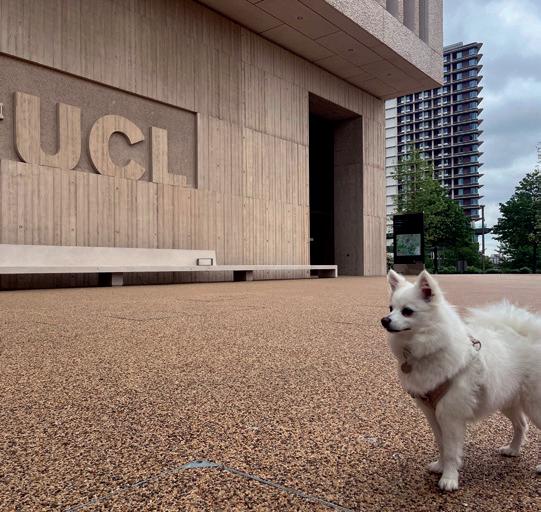
Scan the NaviLens QR code, or search: ‘UCL Open Days’ to find out more
–
–
Front cover
– UCL Portico and Front Quad. Courtesy of Lucy Pope
Inside front cover
Aerial photographs showing UCL’s location in central and east London. © Jason Hawkes
p02–03
– See page for captions. – The Micrarium. Courtesy of Dongyue Xie/ LoveUCL
– UCL Portico. Courtesy of Matt Clayton
– Woburn Walk. Courtesy of Mary Hinkley/UCL Digital Media
– The Marshgate building. Courtesy of Brittany Wong/LoveUCL
UCL Quadrangle. Courtesy of Elaine Perks
– Russell Square. Courtesy of Mary Hinkley/UCL Digital Media
Fragments of Memory sculpture. Courtesy of Jizheng Tan/LoveUCL
Cruciform Building at night. Courtesy of Dash Wong/LoveUCL
p04
– UCL’s Bloomsbury campus. Courtesy of Mary Hinkley/UCL Digital Media
p06
– See page for caption. Courtesy of Lucy Pope
p08–09
UCL researchers work on NASA’s ANITA experiment. This Antarctic-based observatory detects ultra-high-energy neutrinos, giving insights into the universe beyond our galaxy. Courtesy of Ryan Nicol
– Conducting research in the laboratory. Courtesy of James Tye
– UCL Mechanical Engineering students working on their IMechE Formula Student car. Courtesy of UCL Engineering/James Tye
– Students collaborating in the Marshgate building, UCL East. Courtesy of James Tye
p10–11
Sir William Ramsay's discovery of the noble gases powered some of the world's most significant technological advances. Courtesy of Unsplash
– Sir Roger Penrose was awarded the Nobel Prize in Physics in 2020 for proving that the general theory of relativity predicts black holes. Courtesy of Adobe Stock/Redpixel
– Statue of Rabindranath Tagore, a poet, artist and musician who shaped Bengali culture in the late 19th and early 20th centuries. Courtesy of Mat Wright
p12–13
– Trees in the Amazon Rainforest in Ecuador. Courtesy of Maris Maskalans/Getty Images
– Star-forming region Messier 78. Courtesy of ESA/Euclid/Euclid Consortium/NASA, image processing by J.-C Cuillandre (CEA Paris-Saclay), G Anselmi
– UCL MotionInput software in use. Courtesy of Ellis Norton
– Technician examining blood sample test tube. Courtesy of Jacob Wackerhausen/ istockphoto.com
p14–15
– Generation One campaign images (forest fire; landfill site, tall trees). Courtesy of Getty Images
– With cycle racks, bike hangars and a Bike Buddy scheme, students are encouraged to cycle to UCL. Courtesy of Sustainable UCL/ Poppy Stockbridge – The School of Management will gain an additional four floors in Canary Wharf by 2027. Courtesy of James Tye
p16–17
– Founders of Your Juno financial education app. Courtesy of Your Juno
BoxxDocks co-founder James Della Valle. Courtesy of BoxxDocks
– ZNotes founder Zubair Junjunia. Courtesy of Zubair Junjunia
p18–19
The Marshgate building at UCL East is eight floors of hi-tech research labs, workshops and teaching areas. Courtesy of James Tye
Interior of UCL’s Student Centre. Courtesy of Matt Clayton
p20–21
– See page for captions.
– Public art installation. Courtesy of James Tye
– The landscaped parklands of UCL East; the auto-icon of Jeremy Bentham. Courtesy of Mary Hinkley/UCL Digital Media
– Flaxman Gallery. Courtesy of Ronggang Yan/ LoveUCL
p22–23
– Gordon Square. Courtesy of Mat Wright
– Student planting at the IOE during Sustainability Week. Courtesy of Sustainable UCL/Poppy Stockbridge
– Students enjoying the greenery of the East Bank. Courtesy of Morley von Sternberg
– Exterior of UCL’s Student Centre looking out onto the Japanese Garden. Courtesy of Matt Clayton
– UCL is ranked 5th in the world for environmental sustainability. (QS World University Rankings 2025)
p24–25
– Watch one of Shakespeare’s plays at the Globe Theatre. Courtesy of Mat Wright
The British Museum, founded in 1753, was the first national public museum in the world. Courtesy of Mat Wright
– The Houses of Parliament – seat of UK government. Courtesy of Mat Wright
p26–27
– See page for captions.
– 1 Pool Street. Image c ourtesy of James Tye
– Students exploring the East Bank on Santander bikes. Image courtesy of James Tye
– The Media Suite, Marshgate. Image courtesy of Kristin Holst
p30–31
– A warm welcome awaits new arrivals to UCL. Images courtesy of James Tye
p32–33
– TeamUCL rowing students at the 2022 London Varsity Series. Courtesy of UCL Boat Club
– Elected student officers 2022/23. Courtesy of Sophie Mitchell Photography
– Student playing the trumpet. Courtesy of Students’ Union UCL
p34–35
– UCL alumna, Abigail Irozuru. Courtesy of Adam Roussak
– Recent graduates celebrating their graduation. Courtesy of Alejandro Walter Salinas Lopez/UCL Digital Media p36–37
– Our Student Ambassador team help out at events such as Open Days and Graduation. Courtesy of James Tye
– Students relaxing in the pedestrianised Gordon Square. Courtesy of Sophie Mitchell Photography
– Therapy dogs occasionally visit the campus to help our students during stressful times like the examination period. Courtesy of James Tye p38–39
– As a UCL student or recent graduate, you’re welcome to attend all UCL Careers Fairs. Images courtesy of Kirsten Holst p40
– The Institute of Archaeology Library holds an extensive range of international archaeological and heritage collections. Courtesy of Sophie Mitchell Photography
– Part of the UCL–Ventura CPAP device, developed as a breathing aid for COVID-19 patients. Courtesy of UCL Engineering/ James Tye
– Each year, The Slade School of Fine Art holds an exhibition of student work. Courtesy of UCL Digital Media
– A Population Health Student conducting an experiment in the lab. Courtesy of Alejandro Walter Salinas Lopez/UCL Digital Media p41
– A lecture in the Greek and Latin library in Gordon House. Courtesy of James Tye
– UCL Art Museum collections include more than 10,000 works of art across a range of media. Courtesy of Mat Wright p42
– The Bartlett’s workshops at 22 Gordon Street host a range of resources. Courtesy of Benjamin McMahon
– UCL at Here East boasts high-tech facilities, workshops and laboratories. Courtesy of James Tye p43
– Join a community that is passionate about advancing the understanding of the human brain and nervous system. Courtesy of Dr Jake Fairnie
– Our research includes investigating how speech can be affected by dementia to treatments for mental health disorders. Courtesy of Dr Jake Fairnie p44
– IOE students working collaboratively. Courtesy of Mat Wright
–
–
– Socialising on the terrace of The Institute
Bar, at the IOE’s home on 20 Bedford Way. Courtesy of Mat Wright
p45
– MechSpace is a student hub for designing and building practical projects. Courtesy of UCL Engineering
Our students have access to state-of-theart technology and facilities. Courtesy of UCL Engineering
p46
– Inside Bentham House, the Faculty of Laws’ iconic Grade II listed home. Courtesy of UCL Faculty of Laws
– The Moot Court in Bentham House. Courtesy of Mat Wright
p47
– An undergraduate student wearing protective eyewear while conducting an experiment in the School of Pharmacy. Courtesy of David Bishop – UCL School of Pharmacy’s facilties include a Nuclear Magnetic Resonance Spectrometer. Courtesy of David Bishop
p48
– Students in a physics laboratory. Courtesy of Alejandro Walter Salinas Lopez/ UCL Digital Media
– UCL scientists are part of a team using drones to monitor the behaviour of volcanoes, such as this in Papua New Guinea. Courtesy of Emma Liu
p49
– Researchers at the UCL Cancer Institute. Courtesy of Alejandro Salinas Lopez/ UCL Digital Media
UCL works closely with several major teaching hospitals to provide a world-class medical education. Courtesy of Doberman84/Dreamstime.com
p50
– The permanent art installation Gaia at UCL East. Courtesy of James Tye
p51
– UCL Culture Collections are available to students. Images courtesy of Mat Wright
p52
– UCL’s Main Library. Courtesy of Mat Wright
p54–55
– The Geography Department Map and Reading Rooms contain a huge range of resources for Geography students.
Courtesy of Sophie Mitchell
– The Petrie Museum holds around 80,000 objects including these shabtis, making it one of the greatest collections of Egyptian and Sudanese archaeology in the world.
Courtesy of Kirsten Holst
– A student at work in a laboratory in UCL’s Cruciform Building – a hub for the study of medical and life sciences. Courtesy of Mat Wright
– UCL Computer Science’s Immersive Virtual Environments Laboratory. Courtesy of Paula Smith Photography
– UCL’s Special Collections of manuscripts, archives and rare books in the UK are accessible for research, teaching and engagement. Courtesy of Mat Wright
– Earth Sciences student measuring the strike and dip of tilted beds in Devon. Courtesy of UCL Earth Sciences
p56–57
– The Bartlett’s B-made workshops encourage students to merge crafts and manufacturing with science, technology and design. Courtesy of James Tye
– Engineering and Architectural Design student working in UCL's facilities at Here East. Courtesy of James Tye
p58–59
– Students create a bespoke programme incorporating both arts and science subjects. Courtesy of Alejandro Walter Salinas Lopez/UCL Digital Media
– There are a number of study spaces on campus and a Common Room. Courtesy of James Tye
– The Arts and Sciences Common Room in Malet Place. The mural on the wall is a commissioned illustration for the UCL Goldman Sachs 10,000 Small Businesses programme. Courtesy of Mat Wright
p60–61
– UCL’s Francis Wall Oliver Research Centre on Blakeney Point, Norfolk. Courtesy of Tim Blackburn
– Our degrees incorporate a high level of practical work. Courtesy of David Bishop
– Practical sessions in laboratories are a key component of programmes in Biological and Life Sciences. Courtesy of David Bishop
p62
– Students collaborate at the School of Management facilities at Canary Wharf, to tackle the challenging business and management landscape. Courtesy of UCL School of Management
p63
–
p64
UCL’s Media BA offers a number of pathways, including designing for virtual reality. Courtesy of Adobe Stock/kegfire
– UCL Computer Science students interacting with a quadruped robot at UCL East. Courtesy of James Tye
p65
– UCL’s Main Library houses collections related to economics, public policy, human rights and international relations among others. Courtesy of Mary Hinkley/UCL Digital Media
p67
– The IOE’s Newsam Library holds extensive collections on education and related areas of social science. Courtesy of UCL Creative Media Services
p68
– Our students have access to state-of-the-art labs and facilities Courtesy of UCL Engineering/James Tye
p70
– Steps to Progress installation by UCL PhD student Harvey Wiltshire on the entrance staircase to UCL's Main Library. Courtesy of Paula Smith Photography
p71
– Students at The Slade School have access to facilities across all the studio subject areas of painting, sculpture and fine art media. Courtesy of Alejandro Walter Salinas Lopez/UCL Digital Media
p72
– A genealogical table of the kings of England to Edward IV, showing the descent of England's kings from Adam and Eve. This manuscript was bequeathed to UCL by an alumna. Courtesy of Mat Wright
p74
– Students have access to nearly 10,000 online recordings, including documentaries, lectures, audio and videos, in a wide variety of languages. Courtesy of James Tye
– The exterior of the SSEES building on Taviton Street. Courtesy of Tony Slade/ UCL Digital Media
p78
–
The recently redeveloped Bentham House includes a bright, spacious social hub and cafe for UCL Laws students. Courtesy of UCL Faculty of Laws
p79–80
– The UCL-led PanCam that provides the 'eyes' for the European Space Agency's ExoMars Rover Rosalind Franklin. Courtesy of Thales Alenia Space
– UCL Mathematical and Physical Sciences student at one of our Open Days. Courtesy of James Tye
p81–82
– Researchers working in the laboratory. Courtesy of Alejandro Walter Salinas Lopez/ UCL Digital Media
– Students at the UCL Ear Institute, the largest centre for research into hearing and deafness in Europe. Courtesy of Kirsten Holst
p83–84
– A colourful array of chemicals is showcased inside UCL’s Christopher Ingold building. Sir Christopher Ingold, who served as head of UCL Chemistry (1937–61), is regarded as one of the principal pioneers of physical organic chemistry. Courtesy of Mat Wright
p85–86
– A Psychology seminar group meeting. Courtesy of Dr Jake Fairniey
– Study Psychology and Language Sciences in the heart of London. Courtesy of Mary Hinkley/UCL Digital Media
p96
–
Photos from the #LoveUCL competition on Instagram (clockwise from top): Joshua Bostock; Liang Lei; Noémie Bovey; Caroline Easey; Adam Walker; Elizabeth Hannigan Hooriya Fida-Hussain; Celine Tedja; Weixiang Bao
Thanks to all the staff and students who contributed to this prospectus.
Produced by UCL, February 2025
Original design by Jack Renwick
Studio
Printed by Belmont Press, an FSC® and PEFC certified printer, using an alcohol-free printing process, at a manufacturing facility operating an ISO 14001: 2015 certified Environmental Management System.
This Prospectus has been printed on Soporset Premium Offset, a chlorine-free paper that carries the EU Ecolabel. The range comes from responsibly managed forests that contribute to the reduction of greenhouse gas emissions to the atmosphere and uses forest biomass as its main source of energy.
The information in this publication can also be found at ucl.ac.uk/prospectus on the UCL website.
If you require the information in an alternative format (e.g. large print), please contact us.
+44 (0)20 3108 8520
UCL has sought to ensure that the information given in this Undergraduate Prospectus is correct at the time of going to press but we cannot guarantee that it is accurate.
The information contained in this prospectus is subject to change. We may, for example, need to withdraw or vary any degree programme and/or alter entry requirements, fees, facilities and/or services described.
For the most up-to-date information, please see UCL’s online Undergraduate Prospectus at ucl.ac.uk/prospectus. The online prospectus takes priority over this printed prospectus. As such, you must check the information in the online prospectus before accepting any offer of a place at UCL.

* QS World University Rankings 2010–2025
University College London
Gower Street, London, United Kingdom
WC1E 6BT
Information on UCL degree programmes: study@ucl.ac.uk +44 (0)20 3108 8520 ucl.ac.uk/prospectus
Bluesky: @ucl.ac.uk Facebook: uclofficial Instagram: ucl TikTok: uclofficial YouTube: UCLTV